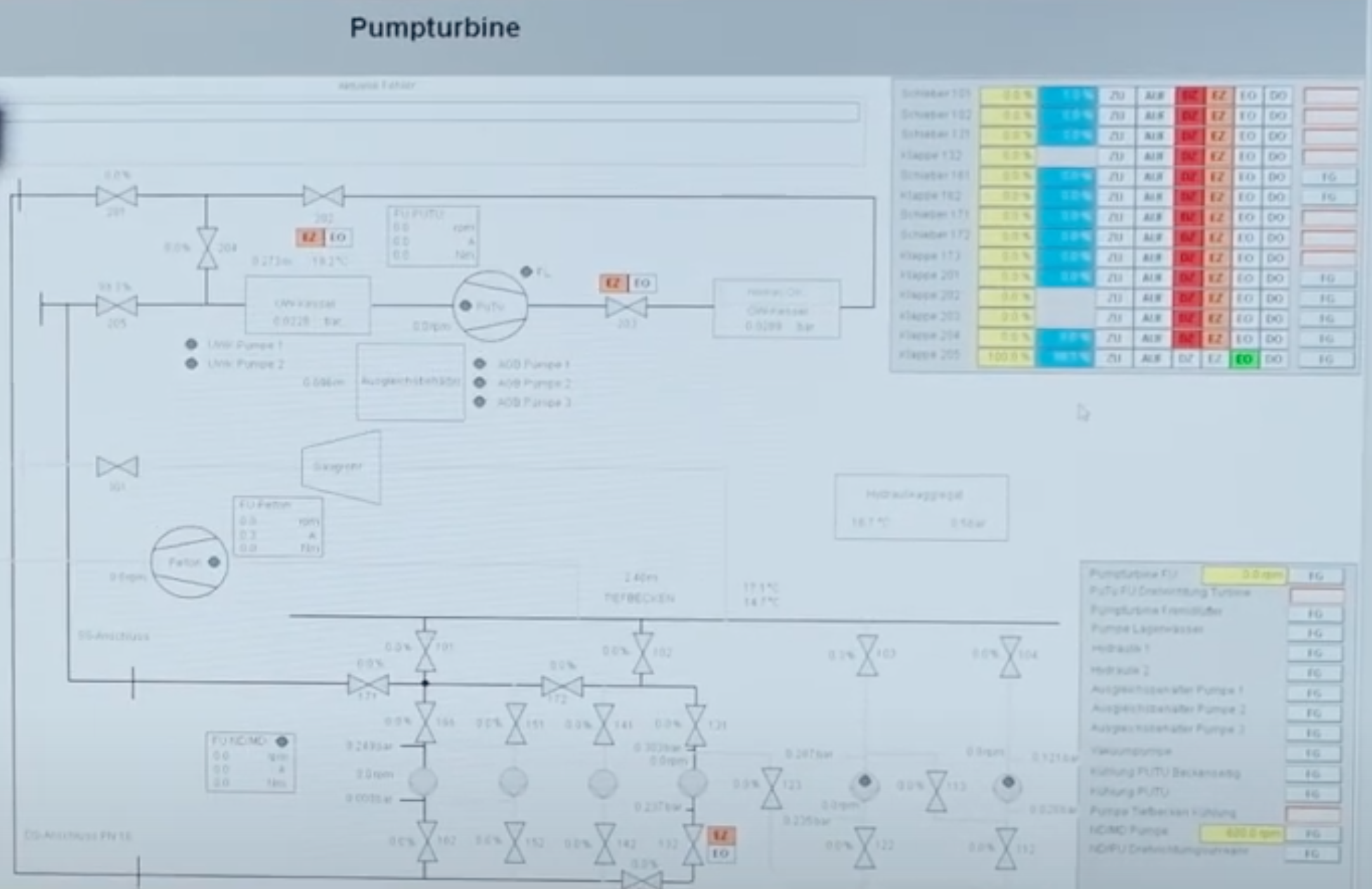Curriculum Vitae
Book Reinforcement Learning
Book Algorithms with Julia
CAIML
Research
START Project
Publications: Journals
Publications: Conferences
Invited Presentations
Teaching
Clemens Heitzinger's
homepage!
1 AI Health Vienna 2025 (13–14 November 2025)
AI Health Vienna 2025 gathered experts from medicine, AI research, law, industry, and policy to explore how artificial intelligence is transforming healthcare. AI Health Vienna 2025 was organized by (in alphabetical order) myself (TU Wien), Oliver Kimberger (MU Wien), Maria Kletecka-Pulker (Universität Wien), Georg Langs (MU Wien), and Georg Wildhalm (MU Wien).
The first day centered on the balance between innovation and regulation, with sessions addressing the ethics of medical AI, digital therapeutics, and start-up ecosystems, as well as the structural challenges of implementing innovations in healthcare. The day ended with a panel debating whether current legal frameworks sufficiently support AI driven innovation.
The second day highlighted concrete clinical applications of AI, featuring talks on imaging, dermatology, emergency medicine, and ophthalmology. Keynotes examined the strategic role of digitalization in healthcare (by Markus Müller, Rector, MU Wien) and the neurobiology of artificial intelligence (by Peter Robin Hiesinger, FU Berlin). A final panel discussion reflected on how humans, machines, and medicine will jointly shape the coming era of AI enabled care.
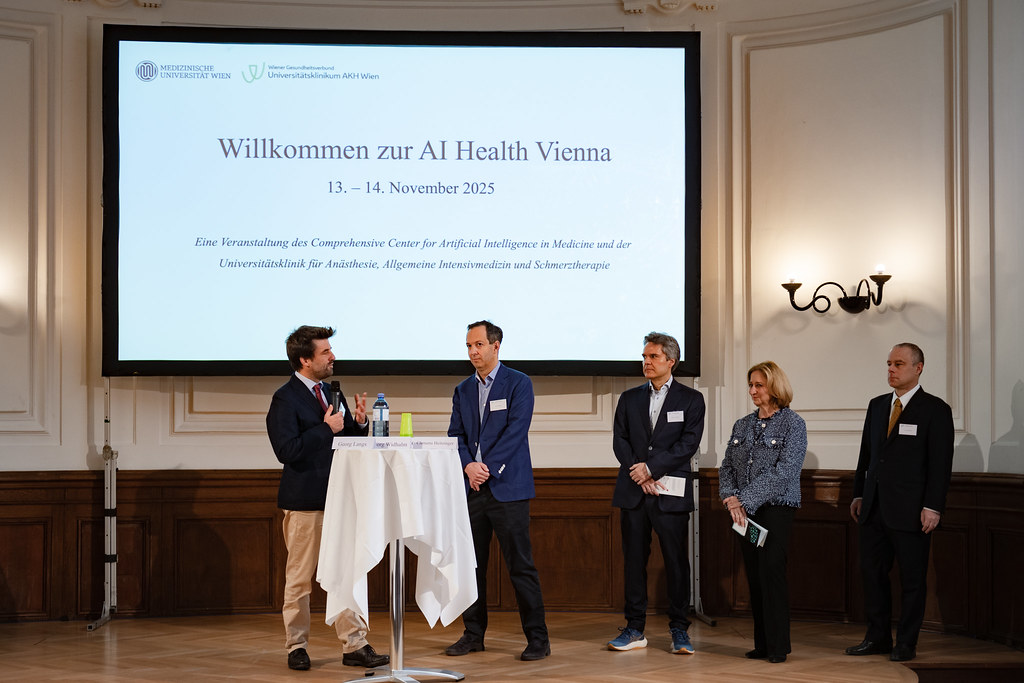
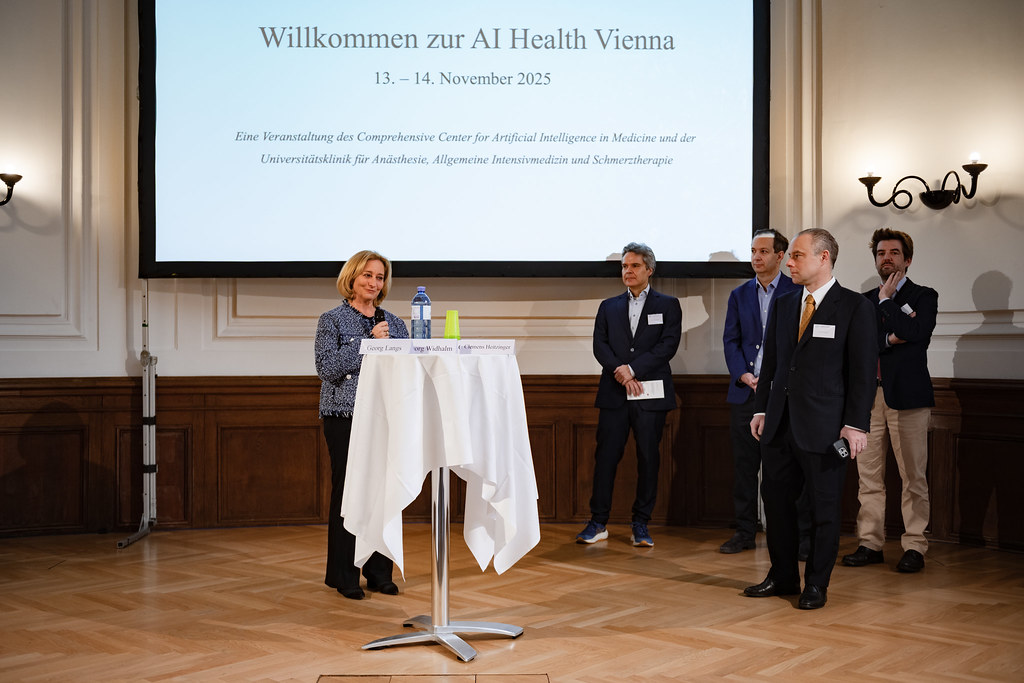
1.1 Panel on Day 1 (13 November 2025)
- Topic: Are the legal regulations for the use of AI in healthcare sufficient, or are there already too many for innovation?
- Moderator: Bianca Schwarzjirg (moderator)
Panelists in alphabetical order:
- Gerhard Aigner (Institute for Ethics and Law in Medicine, Universität Wien)
- Markus Egger (CODE Consulting, CODE Magazine, and reTECH Europe)
- Birgit Hofreiter (Innovation Incubation Center, TU Wien)
- Tanja Spennlingwimmer (Austria Wirtschaftsservice (AWS))
- Gerhard Zotter (Federal Procurement Agency (Bundesbeschaffung GmbH))
1.2 Panel on Day 2 (14 November 2025)
- Topic: Human, Machine, Medicine – Entering the Age of AI
- Moderator: Isabelle Daniel (journalist)
Panelists in alphabetical order:
- Gernot Blümel (Mare TechnoPark)
- Eva Dichand (Chair of the University Council, MU Wien)
- Markus Egger (CODE Consulting, CODE Magazine, and reTECH Europe)
- Harald Kittler (dermatology, MU Wien)
- Siegfried Meryn (Future Health Lab)
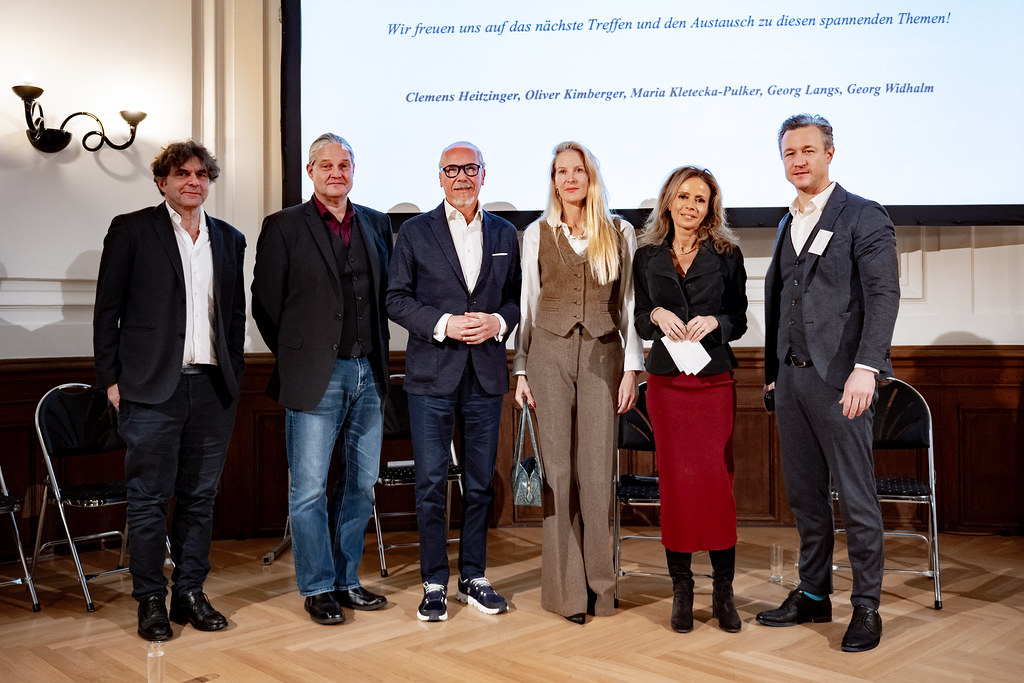
1.3 The Program
2 Dreiländertreffen Herzinsuffizienz (12–14 October 2025)
I will give a talk at the Dreiländertreffen Herzinsuffizienz, organized by the Austrian Society for Cardiology, in Salzburg.

3 Keynote at the International Conference on Complex Acute Illness (20 September 2025)
The International Conference on Complex Acute Illness (ICCAI 2025), organized by the Society for Complex Acute Illness (SCAI), took place from 18 till 20 September 2025 at the Medical University of Vienna. I was honored to give a keynote on “Optimal Treatment Policies and their Evaluation” and talked how reinforcement learning can be used to make use of data collected in intensive-care units.


4 Report on AI Health Vienna 2024 (16 January 2025)
Our department published a summary of AI Health Vienna 2024 here.
5 AI Health Vienna 2024 (25–26 November 2024)
AI Health Vienna 2024, held on 25–26 November at the Van Swieten Hall of the Medical University of Vienna, gathered approximately 300 participants to discuss the transformative impact of artificial intelligence in healthcare. The event featured keynote speeches and sessions covering topics such as secondary data use, lifestyle and medical apps, challenges in AI integration, and the European Health Data Space.
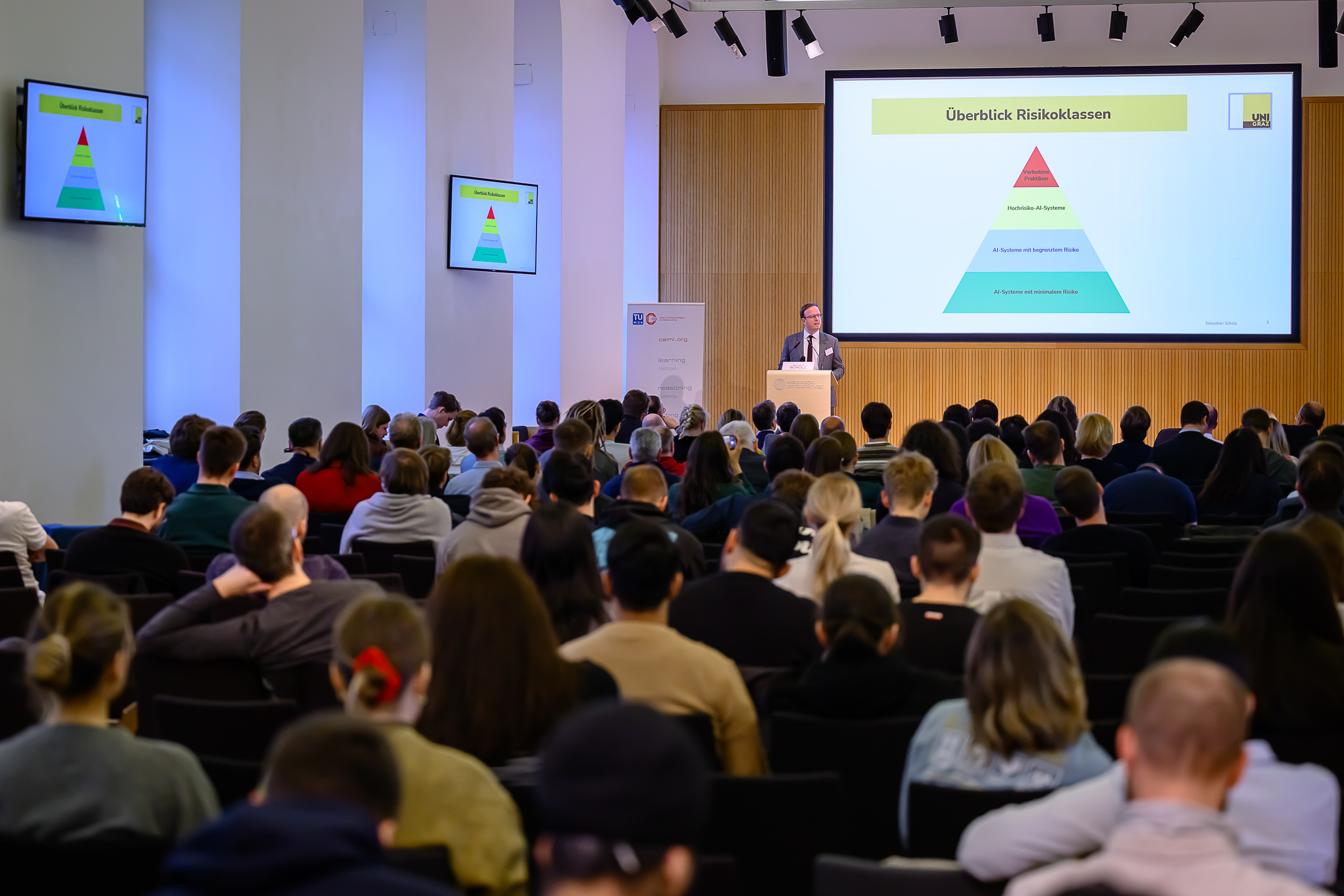
Prominent speakers included Julian Hadschieff, Meinhild Hausreither, Philipp Kellmeyer, Georg Langs, Klaus Marksteller, Bruno K. Podesser, Matthias Samwald, and Karl Stöger (in alphabetical order), who provided insights into AI’s applications, ethical considerations, and regulatory frameworks in the medical field. The conference served as a platform for interdisciplinary dialogue, highlighting the potential of AI to revolutionize healthcare delivery and patient outcomes.
AI Health Vienna is organized by Oliver Kimberger, Maria Kletečka-Pulker, and myself.
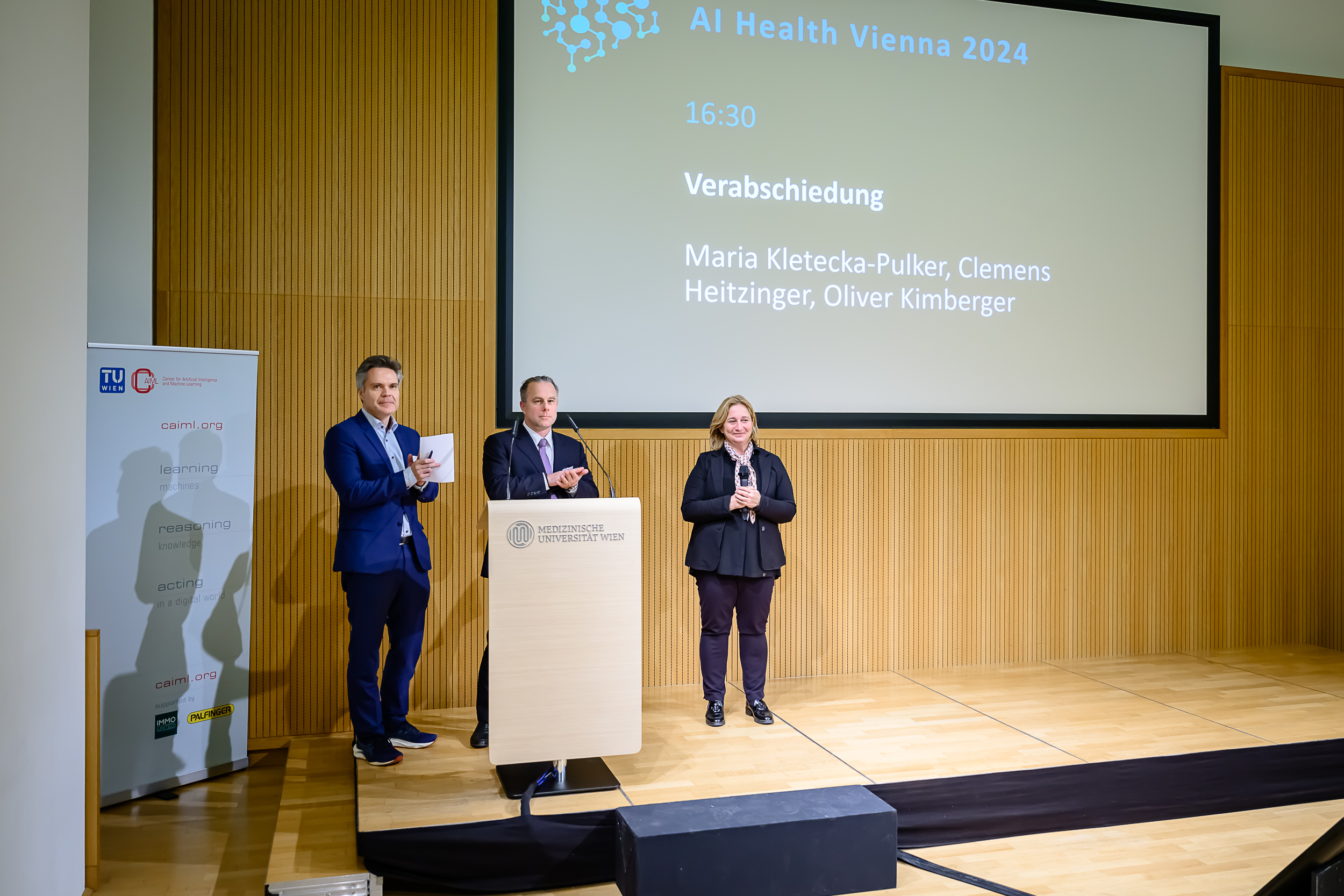
6 Books on Digital Humanism Accessed More Than One Million Times (18 November 2024)
A great success for the Austrian digital-humanism community: the two books Introduction to Digital Humanism (for which I co-authored a chapter) and Perspectives on Digital Humanism have been accessed over one million times in total. You can find more information in this article.
7 ORF Upper Austria Reports on AI in Hospitals (23 October 2024)
On 23 Oct 2024, ORF Upper Austria reported in its program Bundesland heute (at minute 14:58) on a congress about AI in hospitals that took place at the Design Center in Linz on the same day.
The 22nd Congress of the Upper Austrian Hospitals Affiliated with Religious Orders (22. internationaler Kongress der oö. Ordensspitäler) was opened by Mother Superior (Generaloberin) Sr. M. Barbara Lehner (Elisabethinen Linz–Wien), Episcopal Vicar (Bischofsvikar) Dr. Adi Trawöger, and Deputy Governor (Landeshauptmann-Stellvertreterin) Mag. Christine Haberlander. The location was packed with more than 500 participants (excluding online participants), showing the great interest of health-care practitioners in AI topics.
The program included a presentation by myself about current applications of machine learning in oncology and intensive-care medicine.
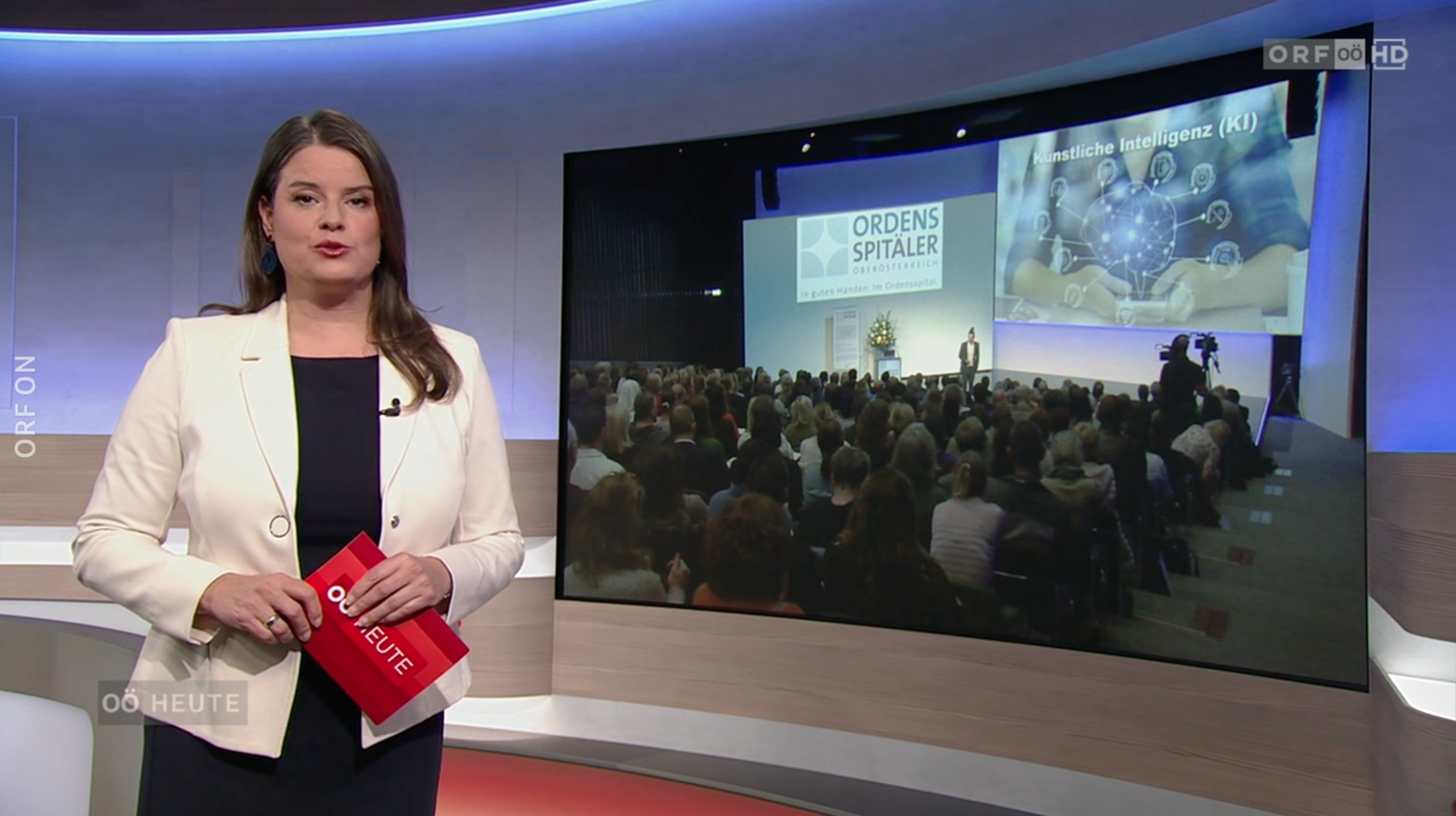
8 Euronews Video Segment (4 October 2024)
On a recent Euronews Witness broadcast (and article) by Julian Gomez, my work on AI solutions, for example for optimizing intensive care units, was highlighted at minute 6:34. In the segment, I discuss the role of recent developments in artificial intelligence, emphasizing how modern AI systems, with their generative capabilities, are now more integrated into everyday technologies like phones and computers. I stress the importance of ensuring these systems function reliably to solve the problems they are designed for. Throughout history, humanity has continually developed tools to make life easier, and AI represents the next frontier in that tradition – especially when applied to safety critical settings.
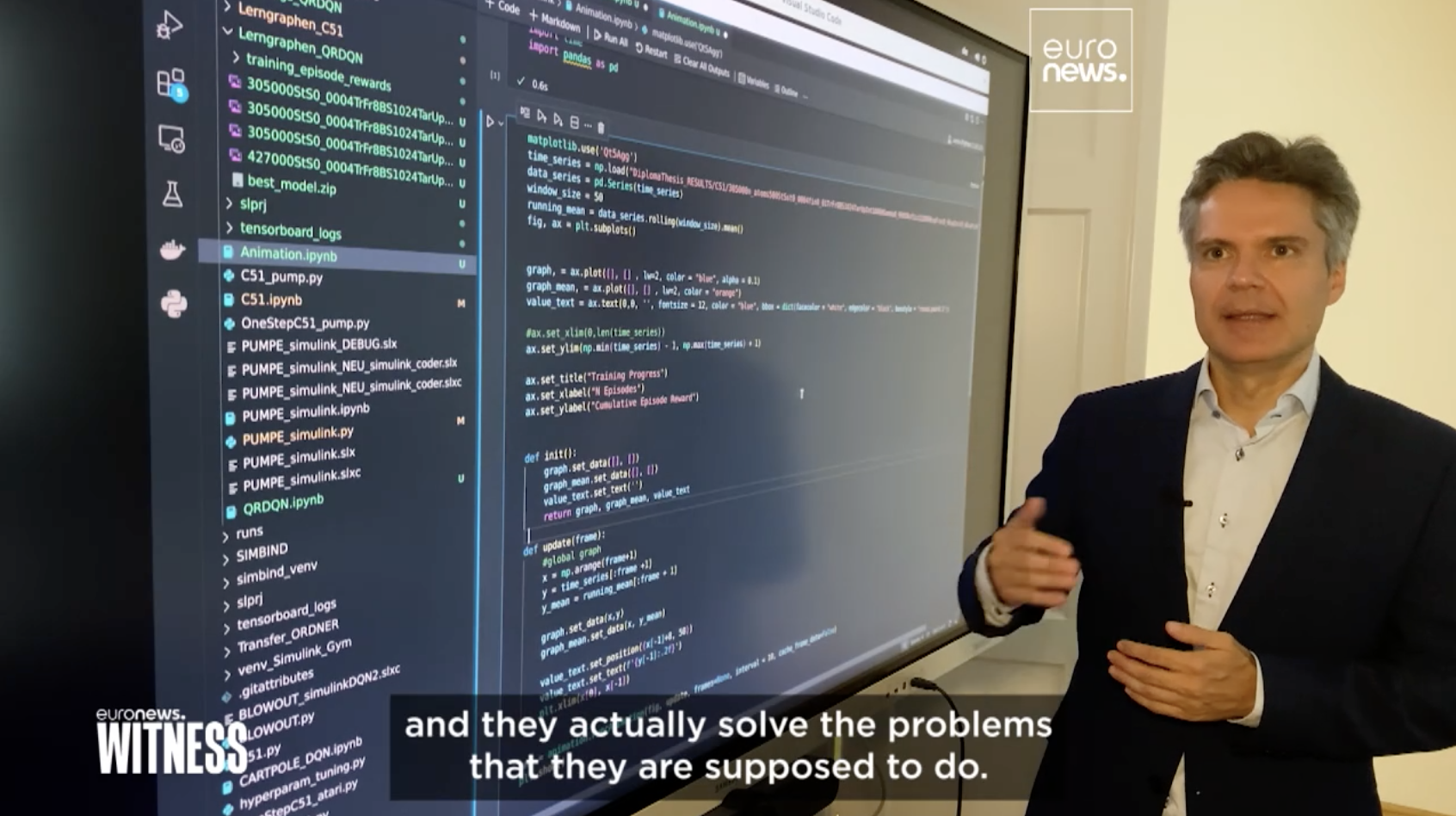
9 Expert Panel on Digital Future Projects for the Job Market of the Public Employment Service (AMS) Austria (3 September 2024)
I am pleased to serve on the expert panel advising the Public Employment Service (AMS) in Austria on digital future projects for the job market. The first meeting of the panel took place on 3 September, where we discussed key strategies and innovative approaches to address the evolving demands of the labor market in a digital age. I look forward to contributing to the panel’s important work in shaping the future of employment in Austria.
10 Article in ORF Topos (30 July 2024)
ORF (Austrian Broadcasting Corporation) Topos published the article Eigene Daten als „Achillesferse“ der KI (Own Data as the “Achilles Heel” of AI) by Mona Harfmann including comments by my colleagues Ivona Brandic and Radu Grosu at the Department for Informatics (Computer Science), TU Wien, and myself.
The article also includes an excellent introductory video about large language models such as ChatGPT.
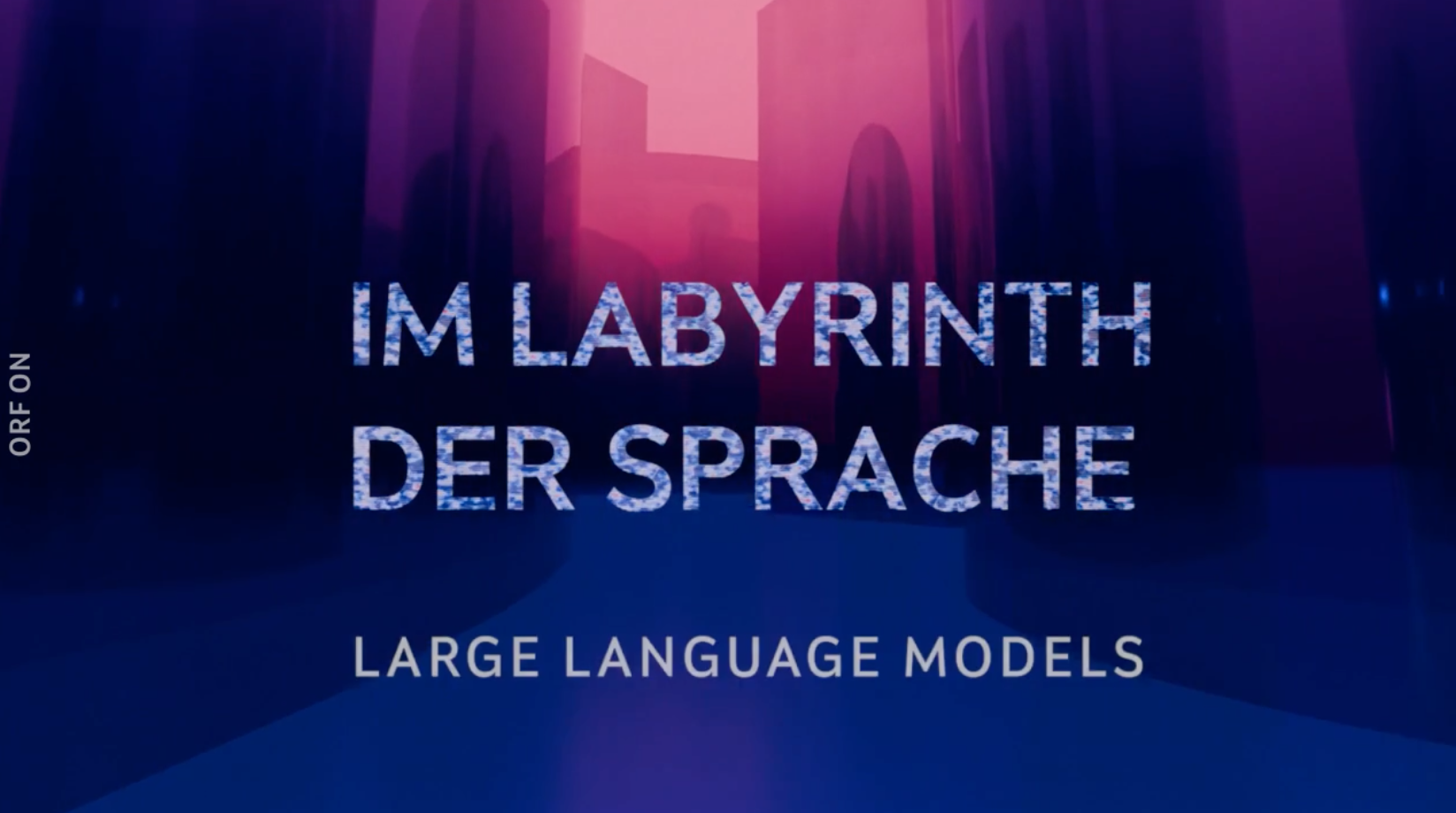
11 Department of Informatics Homepage Features our Reinforcement Learning Work in the RELY Research Project (27 June 2024)
The Department of Informatics (Computer Science) at TU Wien published an article about our FFG research project RELY. We develop and test reinforcement-learning algorithms for the optimal control of pump turbines. Pump turbines are crucial parts of our power grid, since they generate electricity (to meet energy demands) or store energy (when there is an oversupply). They also play a role in regulating the power grid. Reinforcement learning makes it possible to shape the landscape of future energy systems, making them more efficient and resilient while transitioning to renewable energies.
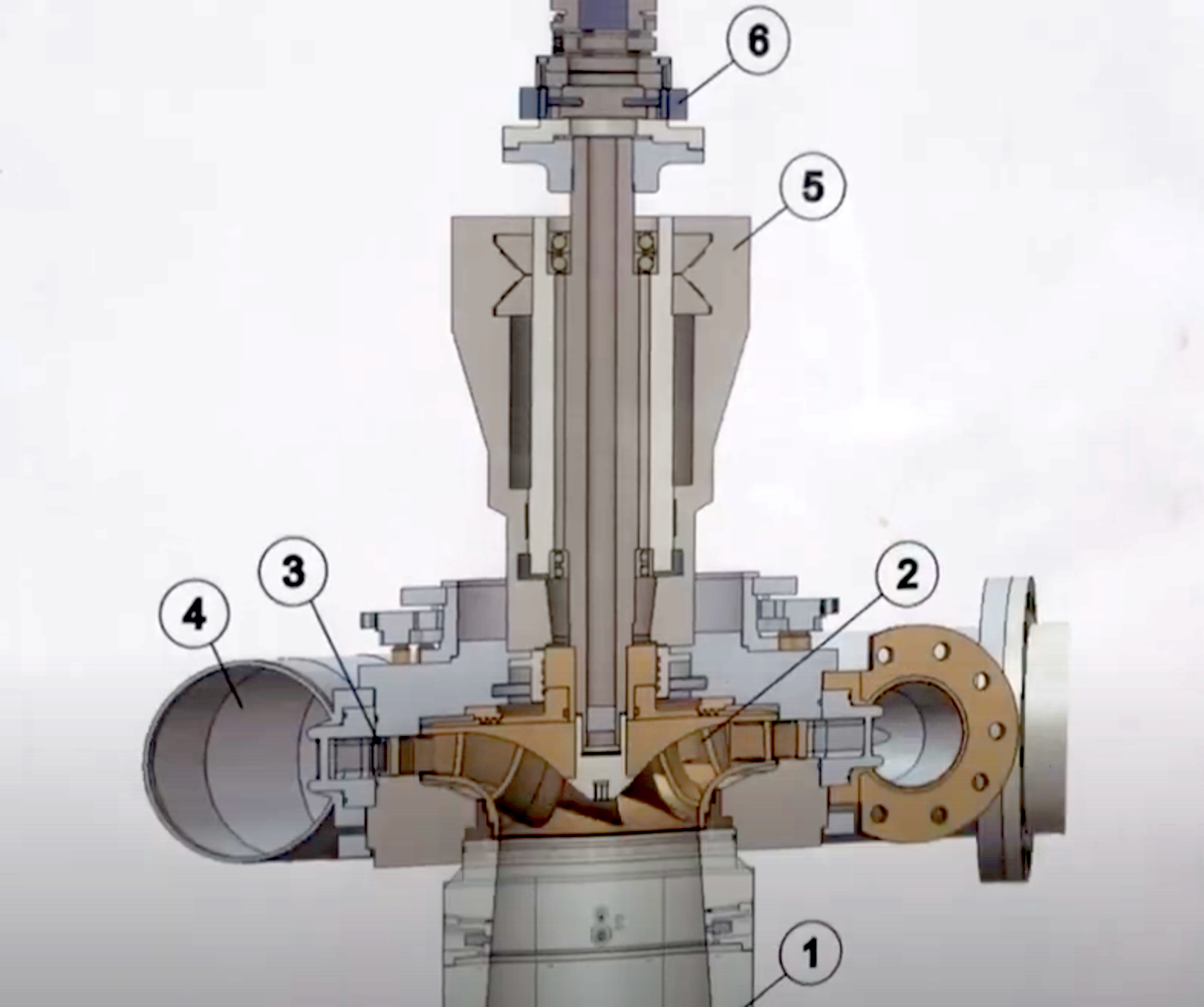
12 TU Wien Homepage Features our Reinforcement Learning Work on Cryogenic Sensors (19 June 2024)
Felix Wagner, one of my MSc students, did a great job in developing a reinforcement-learning system to control cryogenic sensors in the search for dark matter. The system is in use at the CRESST experiment in the Gran Sasso deep underground laboratory in Italy. TU Wien published the article The World’s Most Sensitive Experiment is Controled by AI on the university home page.
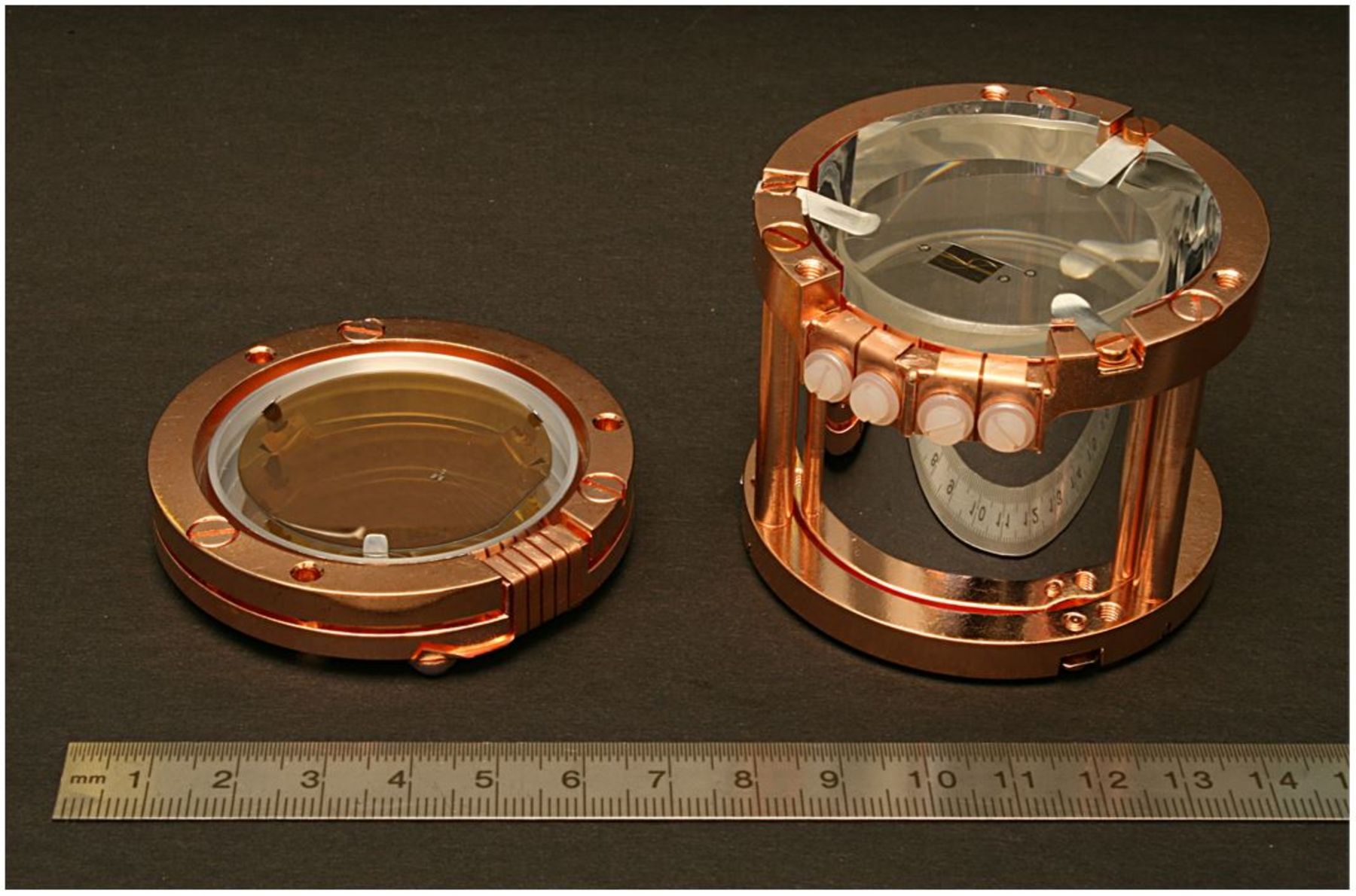
13 Panel Discussion at Vienna Arbitration Days (7 June 2024)
The Vienna Arbitration Days 2024 are Austria’s leading arbitration conference and bring together the international dispute resolution community. This year, they took place from 7 to 8 June 2024 at the beautiful Palais Niederösterreich in the center of Vienna.
In the panel discussion Out of the Dark – into the Digital World, I was happy to discuss the impact of artificial intelligence and large language models in particular on law and arbitration.
- Monica Crespo, Jus Mundi, Paris
- Clemens Heitzinger, Technical University of Vienna, Vienna
- Christian Koller, University of Vienna, Vienna
- Anna Kozmenko, Curtis, Geneva
- Takashi Takashima, UNCITRAL, Vienna (Moderation)
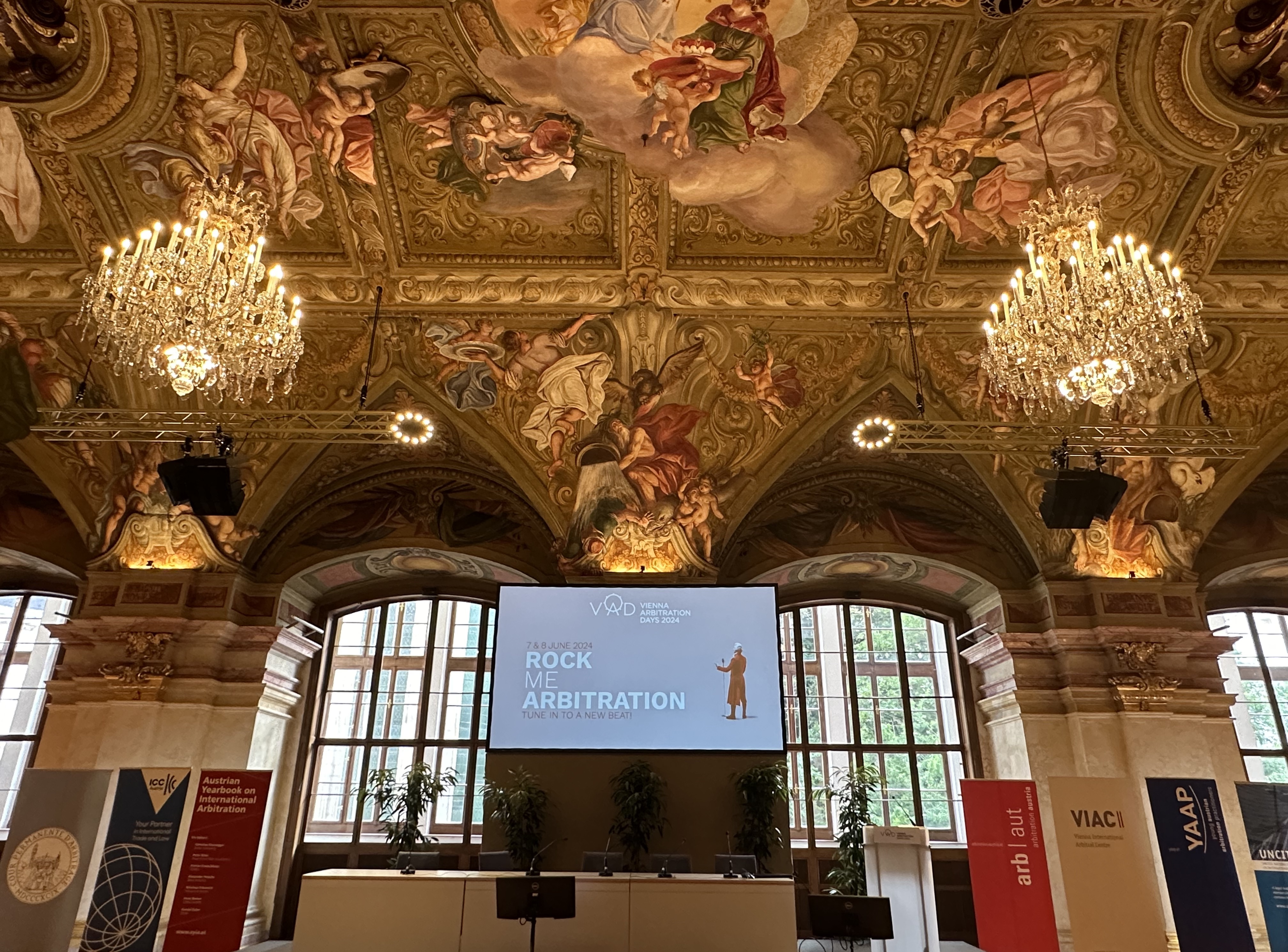
14 Paper at ICRA 2024 (13 May 2024)
The video accompanying our paper Adapting to the “Open World”: the Utility of Hybrid Hierarchical Reinforcement Learning and Symbolic Planning at the 2024 IEEE International Conference on Robotics and Automation (ICRA 2024) is available now. It is also available here.
15 Article in Kronen-Zeitung about AI and Oncology (11 May 2024)
On 11 May 2024, Kronen-Zeitung, Austria’s largest newspaper, published an article by Eva Greil-Schähs about oncology and the use of artificial intelligence to help patients. The article includes comments by the president of the Austrian Society for Hematology and Medical Oncology (ÖGHO), Prim. Univ.-Prof. Dr. Ewald Pöll, and my comments on early prediction, finding optimal personalized therapies, and future developments.
- Wie KI Krebspatienten helfen wird (print version)
- Wie KI jedem einzelnen Krebspatienten helfen wird (online version, 24 April 2024)
- Wie KI jedem einzelnen Krebspatienten helfen wird (via APA, 24 April 2024)
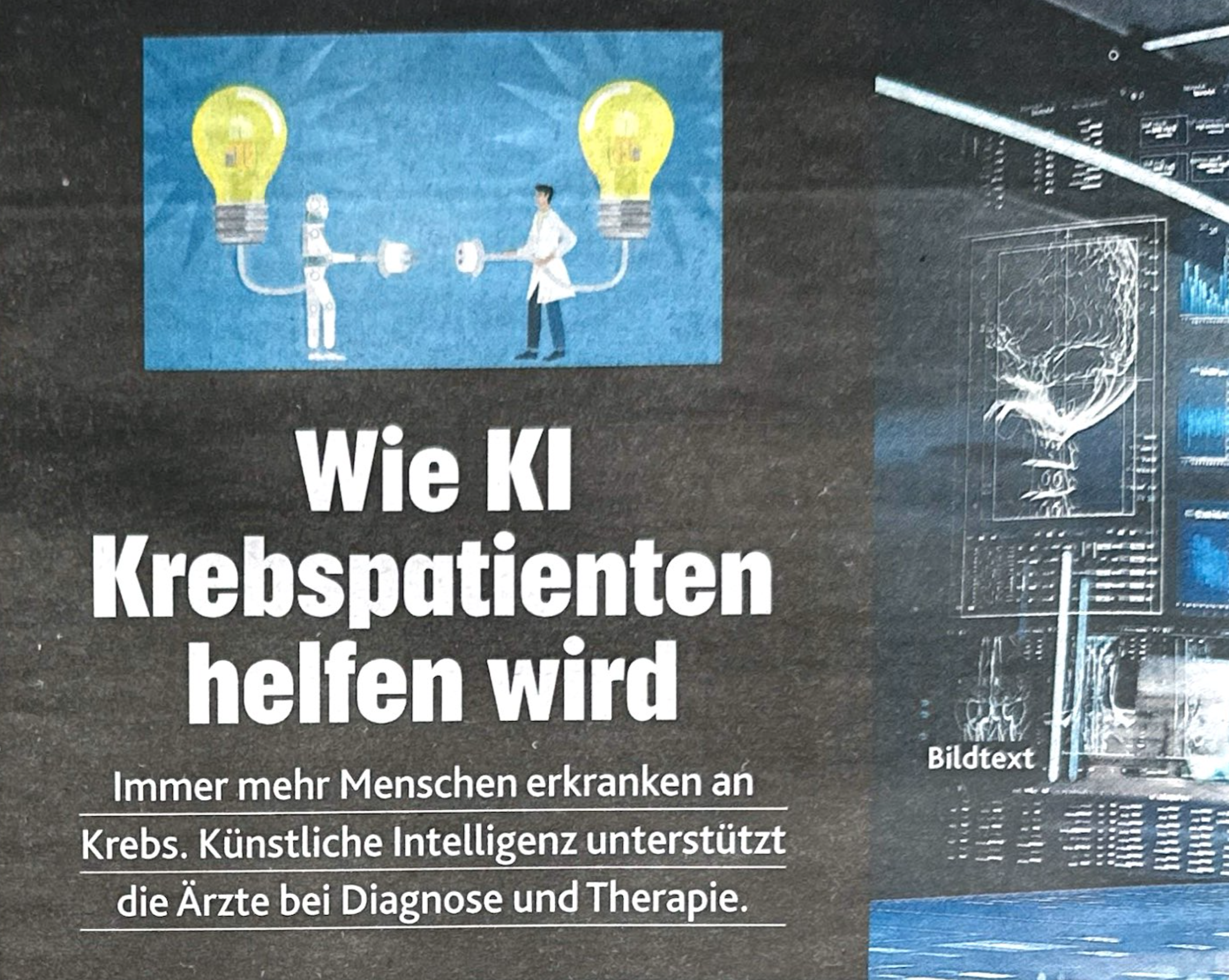
16 Nomination for Austrian National Price in Technology (2 May 2024)
Our FFG research project RELY (Reliable Reinforcement Learning for Sustainable Energy Systems) has been nominated for the Austrian National Price in Technology 2024 (Staatspreis Technologie 2024) by the Austrian Federal Ministry for Climate Action, Environment, Energy, Mobility, Innovation, and Technology in the first category AI for Green together with two other projects or prototypes.
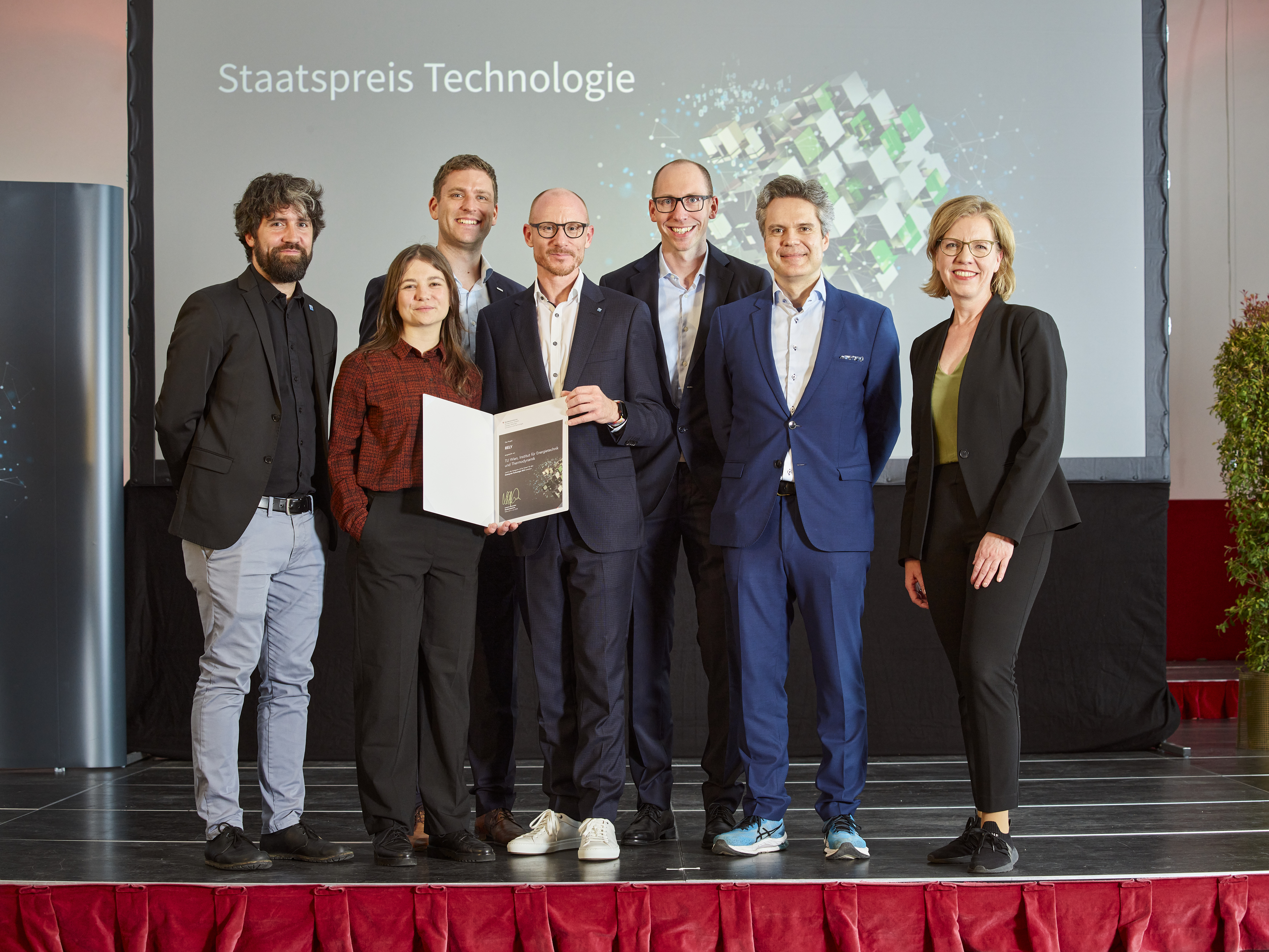
© BMK, Reich
17 Keynote at the Annual Convention of the Austrian Library Network (24 April 2024)
The Austrian Library Network (österreichische Bibliothekenverbund und Service GmbH, OBV) held its annual convention at the University for Continuing Education Krems on 24 April 2024. I was invited to give the keynote on Large Language Models: Functioning and Application Perspectives and would like to thank the organizers for their invitation and the participants for their well thought out questions.
18 Presentation and Panel Discussion at Spring Symposium of the Austrian Society for Hematology and Medical Oncology (4 April 2024)
The Spring Symposium (Frühjahrstagung) 2024 of the Austrian Society for Hematology and Medical Oncology (ÖGHO) and the Arbeitsgemeinschaft hämatologischer und onkologischer Pflegepersonen in Österreich took place from 4 to 6 April 2024 at the Hofburg in Vienna. I gave a presentation and took part in the following panel discussion in the presidential session on 4 April 2024.
- Chairs:
- Richard Greil, Salzburg
- Ewald Wöll, Zams
- Presentation: Clemens Heitzinger, Wien
- Panel discussion:
- Moderation: Richard Greil, Salzburg
- Discussion:
- Luka Brcic, Graz
- Clemens Heitzinger, Wien
- Ewald Wöll, Zams
- Location: Zeremoniensaal, Hofburg
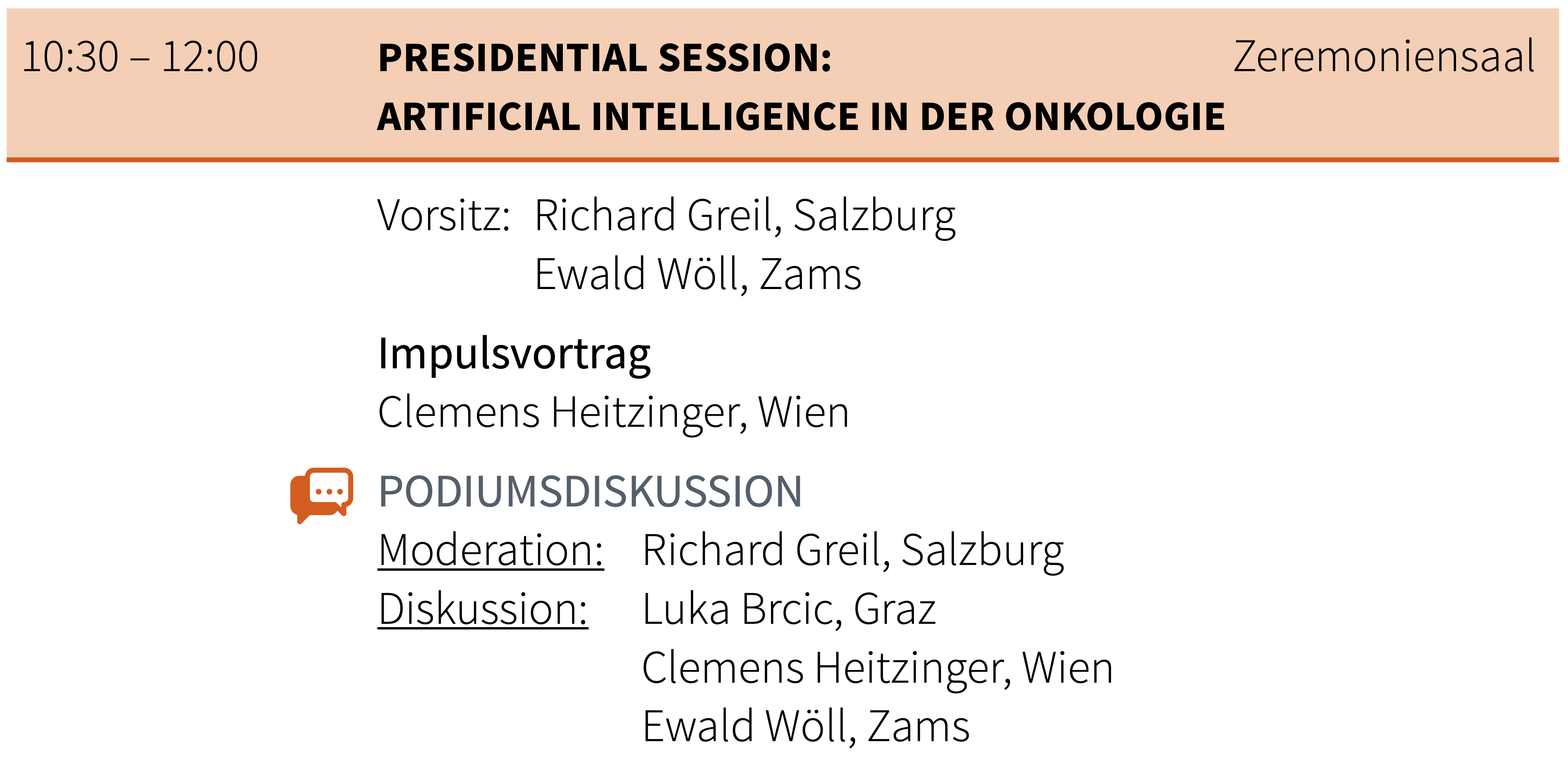
19 Panel Discussion at the Legal 500 GC Summit Austria 2024 (14 March 2024)
The Legal 500 GC Summit Austria 2024 took place at the Hotel Bristol, Vienna, on 14 March 2024. The GC Summit Austria invited the most esteemed in-house counsels from the country’s most prolific companies as well as leading practitioners to discuss their changing roles as in-house leaders and the challenges, issues, and opportunities they are set to face in 2024 and beyond.
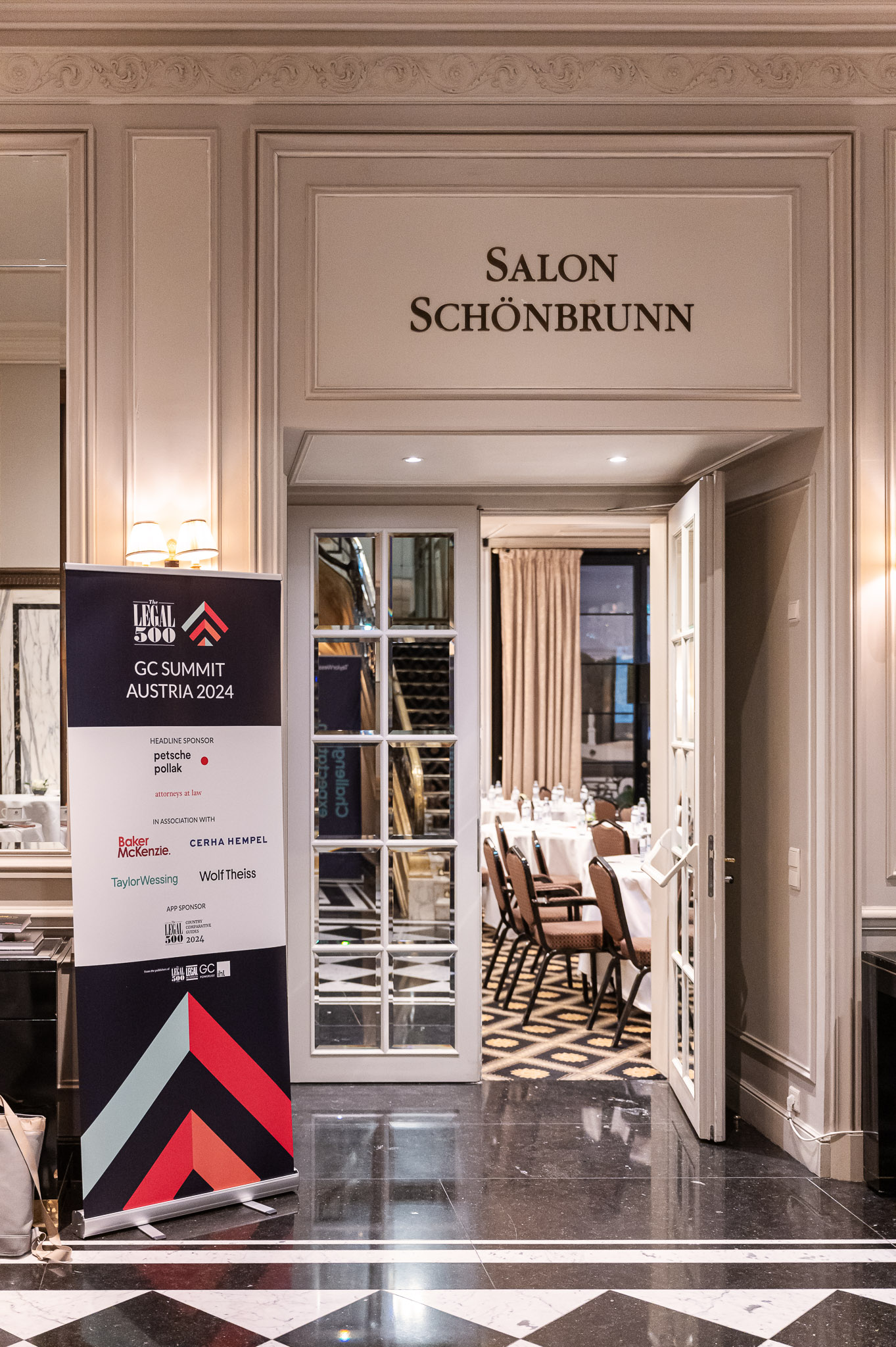
I was happy to discuss AI, the new AI Act, and the changing role of legal departments in a panel discussion organized by Andreas Schütz, Taylor Wessing Vienna.
- Andreas Schütz, partner, Taylor Wessing Vienna
- Dr. Axel Freiherr von dem Bussche, partner, Taylor Wessing Hamburg
- Prof. Dr. Clemens Heitzinger, Co-Director, Center for Artificial Intelligence and Machine Learning (CAIML), TU Wien
- Alexander Sammer, head of legal and investigations, National Anti-Doping Agency (NADA), Austria
- Dr. Peter Lohberger, head of legal, Wiener Wohnen Hausbetreuung GmbH
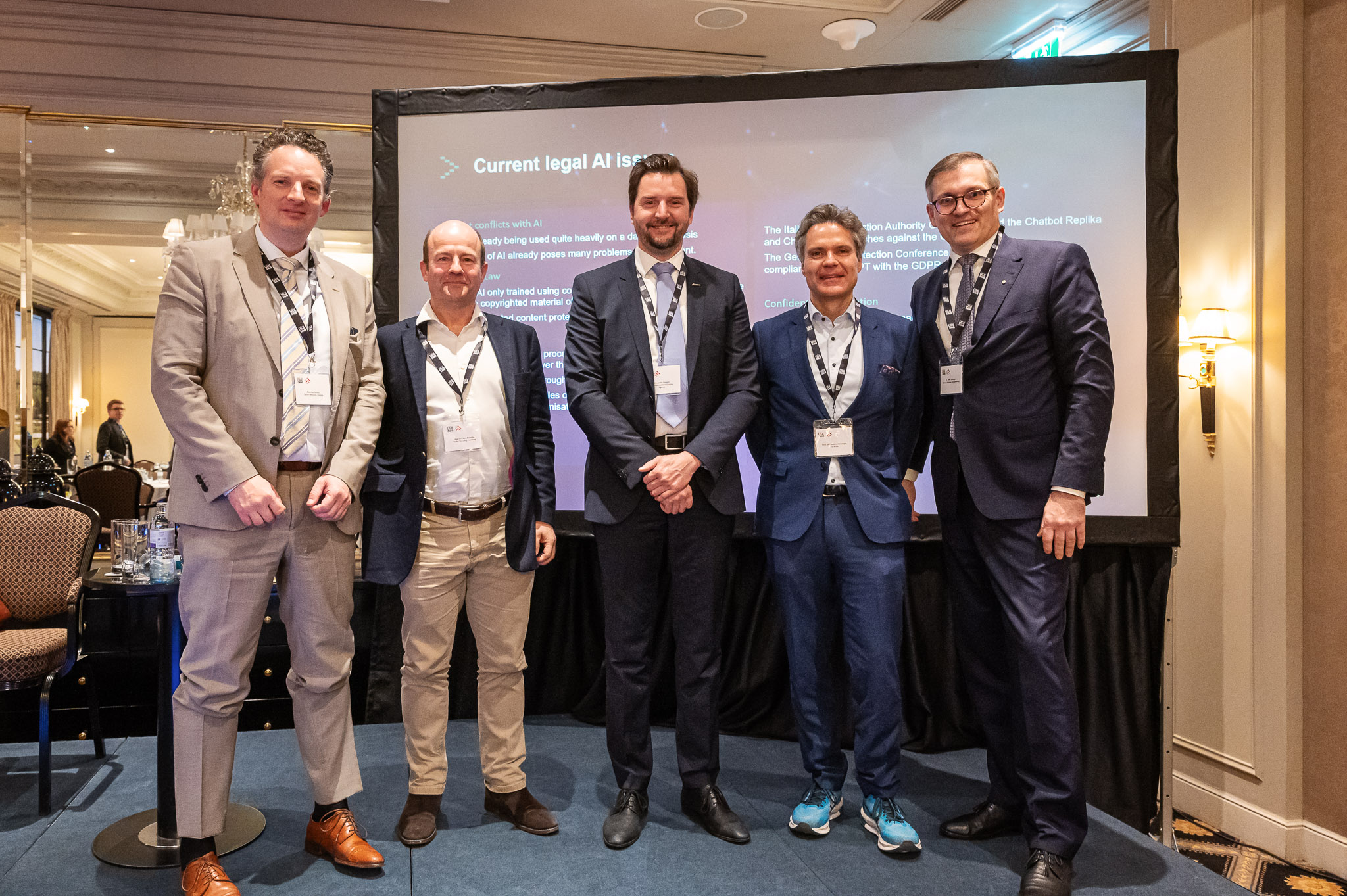
20 Article in Bulletin, the Magazine for TU Wien Alumni (4 March 2024)
In its March 2024 edition, Bulletin, the magazine for TU Wien alumni, features a two-page article about my work on reinforcement learning and calculating optimal medical treatments in the case of sepsis.
21 Talk at the Symposium Automization of Work at WU Wien (29 February 2024)
I was invited to give a talk on how large language models such as ChatGPT and Gemini work at the symposium Automization of Work – Chances and Risks of Usage of Artificial Intelligence in Companies (Automatisierung der Arbeit – Chancen und Risiken des Einsatzes Künstlicher Intelligenz im Betrieb) at the Vienna University of Economics and Business on 29 Feb 2024.
22 Best Poster Award at BIOSIGNALS 2024 for my PhD Student Laurenz Ruzicka (27 February 2024)
Congratulations to my PhD student Laurenz Ruzicka! He won the Best Poster Award at the 17th International Conference on Bio-inspired Systems and Signal Processing (BIOSIGNALS 2024) for his paper Centrality of the Fingerprint Core Location.
23 Course on Reinforcement Learning (Summer Semester 2024)
I am already getting messages asking about my course on reinforcement learning in summer. Thanks for your interest; I will teach it as usual in the summer semester. Since LLM such as ChatGPT and Gemini rely on reinforcement learning in their last and crucial training step, the importance of reinforcement learning is greater than ever. The course has been entered in TISS as 194.163 and 101.789 and will be visible to students later on.
24 Three Articles in APA Science (1 February 2024)
APA (Austria Presse Agentur, the leading Austrian news and press agency) published a bunch of articles on health and AI in its science track on 1 Feb 2024.
The first article, Healthy with AI? („Gesund mit KI?“), by Stefan Thaler (APA Science) is an overview and mentions CAIML and myself towards the beginning.
Another article, How AI Improves Medical Diagnoses and Therapies („Wie KI die medizinische Diagnose und Therapie verbessert“), by Jochen Stadler goes into more depth and includes my comments on recent developments at the beginning.
A third article, What Has Already Become Daily Routine in Many Labs and Clinics („Was in vielen Labors und Kliniken schon Alltag ist“), also by Jochen Stadler, includes a detailed description of my work in reinforcement learning and the development of a decision-support system for medication against sepsis, the leading cause of death in intensive-care units.
25 Talk about Reinforcement Learning at ÖFAI (31 January 2024)
On 31 Jan 2024 I gave a talk on Reinforcement Learning and its Application in Medicine and Large Language Models as part of OFAI’s 2023 Fall Lecture Series. OFAI is the Austrian Research Institute for Artificial Intelligence and has been active in AI research for more than 35 years.
26 Presentation at Symposium of the Austrian Medical Association (26 January 2024)
The Austrian Medical Association (österreichische Ärztekammer) dedicated the first track of its fourteenth annual symposium to AI in medicine and had invited me to give a talk about AI in intensive care. I would like to thank the about three dozen presidents and vice-presidents of Austrian and German federal and state medical associations for the inspiring discussions and insights.
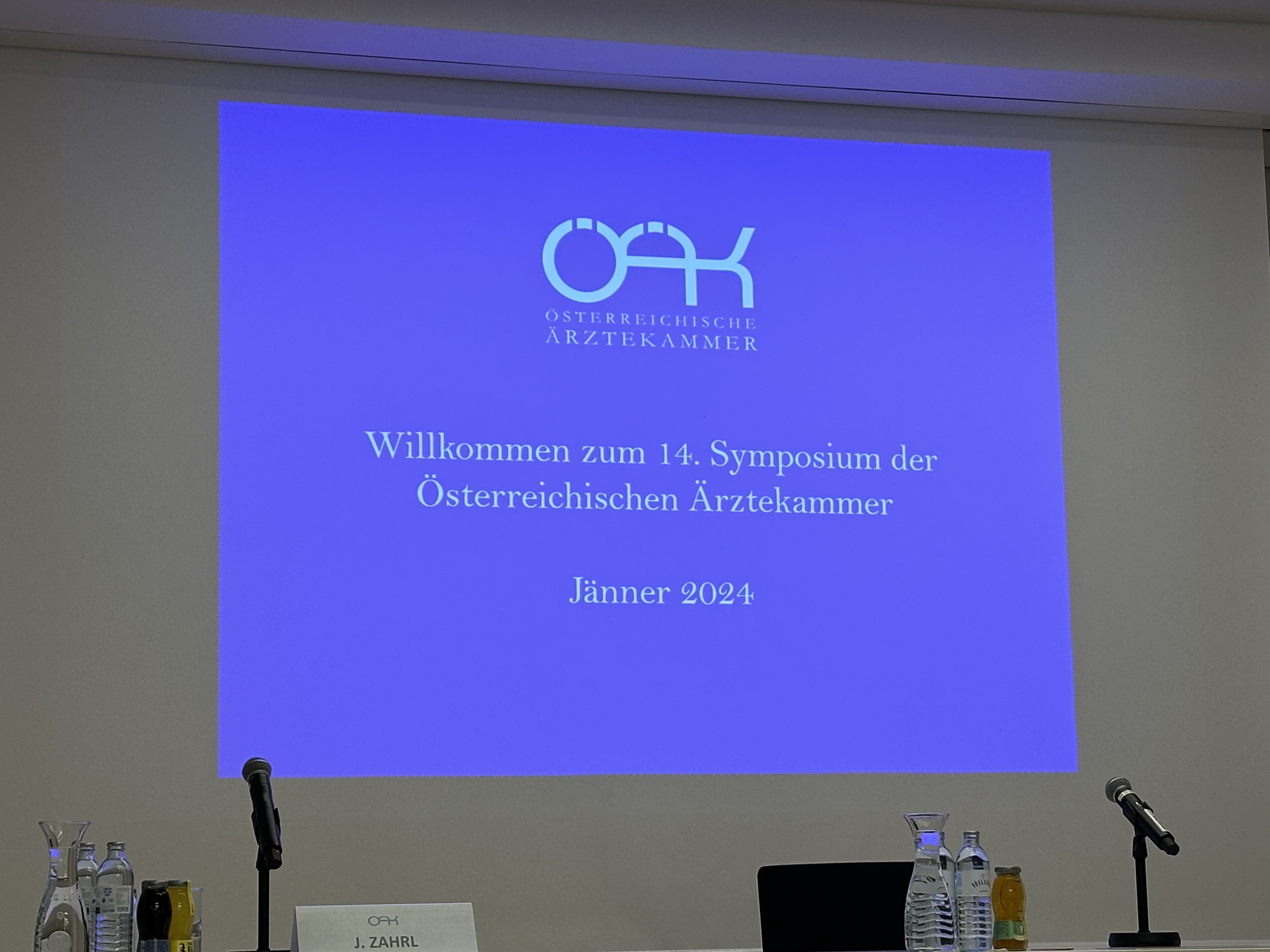
27 The Ö1 Radio Doctor about AI in Medicine (20 December 2023)
On 20 December 2023, Ö1 sent the continuation of the reporting by Maria Harmer from AI Health Vienna 2023, this time in their series Radiodoktor – das Ö1 Gesundheitsmagazin. You can find the 15-minute segment here.
Doktor Digital – Einsatzmöglichkeiten Künstlicher Intelligenz in der Medizin
20. Dezember 2023, 16:40
Die Ideen zum Einsatz Künstlicher Intelligenz in der Medizin sind vielfältig: Computerbasierte Methoden und Maschinelles Lernen sollen Ärztinnen und Ärzte etwa dabei unterstützen, Röntgenbefunde noch treffsicherer zu machen. Als App für das Smartphone sollen sie dazu beitragen, bösartige Veränderungen von Muttermalen früher zu erkennen und so die Entstehung von Hautkrebs verhindern. Aber auch im Bereich des Krankenhausmanagements, etwa bei der Bettenbelegung oder der OP-Planung, sollen KI-Anwendung zukünftig eine wichtige Rolle spielen. Maria Harmer beschäftigt sich in dieser Ausgabe des Ö1-Gesundheitsmagazins mit vielversprechenden Einsatzmöglichkeiten Künstlicher Intelligenz in der Medizin, adressiert aber auch offene Fragen rund um diese Anwendung wie Datensicherheit oder rechtliche Leitlinien.
Moderation und Redaktion: Marlene Nowotny
28 Radio Report in Ö1 about AI Health Vienna 2023 (28 November 2023)
On 28 November 2023, Ö1 sent a 30-minute radio report by Maria Harmer in their series Journal Panorama about our congress AI Health Vienna 2023.
Quoting from Ö1 Journal Panorama:
Algorithmus statt Arzt? Künstliche Intelligenz in der Medizin
Zusammenfassung eines hochkarätig besetzten zweitägigen Symposiums in Wien
28. November 2023, 18:25
Das Erkennen bösartiger Hautveränderungen, die Befundung eines Röntgenbildes, aber auch die Logistik für die Belegung der Krankenbetten und das Schreiben von Arztbriefen: Die Palette der Einsatzmöglichkeiten künstlicher Intelligenz auch im Gesundheitsbereich ist vielfältig, das Potential groß. In einigen Bereichen wird KI bereits angewandt, unzählige weitere Einsatzoptionen im Behandlungszimmer, im OP und in der Intensivmedizin sowie in der Verwaltung werden aktuell erforscht und stetig weiterentwickelt.
Die Chancen und das Potential scheinen unendlich. Doch auch die Liste der offenen Fragen ist lang: Was heißt das für die Patient:innen? Wie sicher sind ihre persönlichen Gesundheitsdaten? Wer haftet bei Schäden, die auf die künstliche Intelligenz zurückzuführen sind? Und was heißt das für Ärztinnen und Ärzte? Werden sie in Zukunft durch nimmer-müde fehlerfreie Maschinen ersetzt, oder ist KI eine sinnvolle Ergänzung und lässt mehr Zeit für andere Aufgabenbereiche?
29 Seminar Talk at Medical University Vienna (16 November 2023)
I was invited to give a talk about machine learning in the context of legal questions regarding applications in medicine in the seminar series on identity and medicine at the Medical University of Vienna.
30 Congress AI Health Vienna 2023 – Closing the Gap (13–14 November 2023)
Revolutionizing health care through artificial intelligence: join the future at AI Health Vienna 2023! You can find the program here and here.
Thanks to the more than 100 participants and their interest in the keynote, the four blocks of talks (introduction and showcases, big data, science talks, and legals issue and road blocks), the public lecture, and the panel discussion.
We also appreciate the video messages by
- Leonore Gewessler (Bundesministerin für Klimaschutz, Umwelt, Energie, Mobilität, Innovation und Technologie),
- Johannes Rauch (Bundesminister für Soziales, Gesundheit, Pflege und Konsumentenschutz), and
- Christoph Wiederkehr (Vizebürgermeister)
(in alphabetical order).
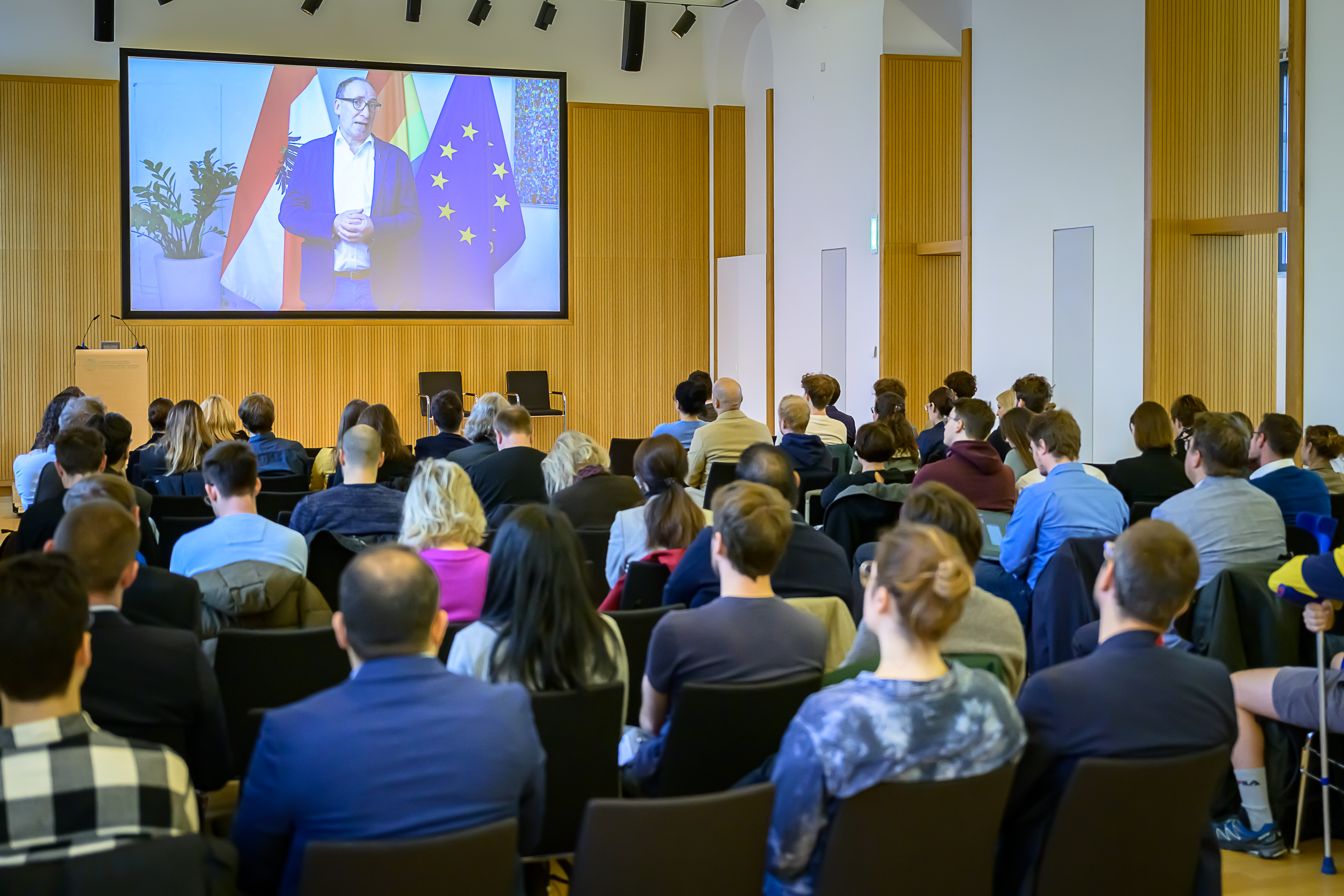
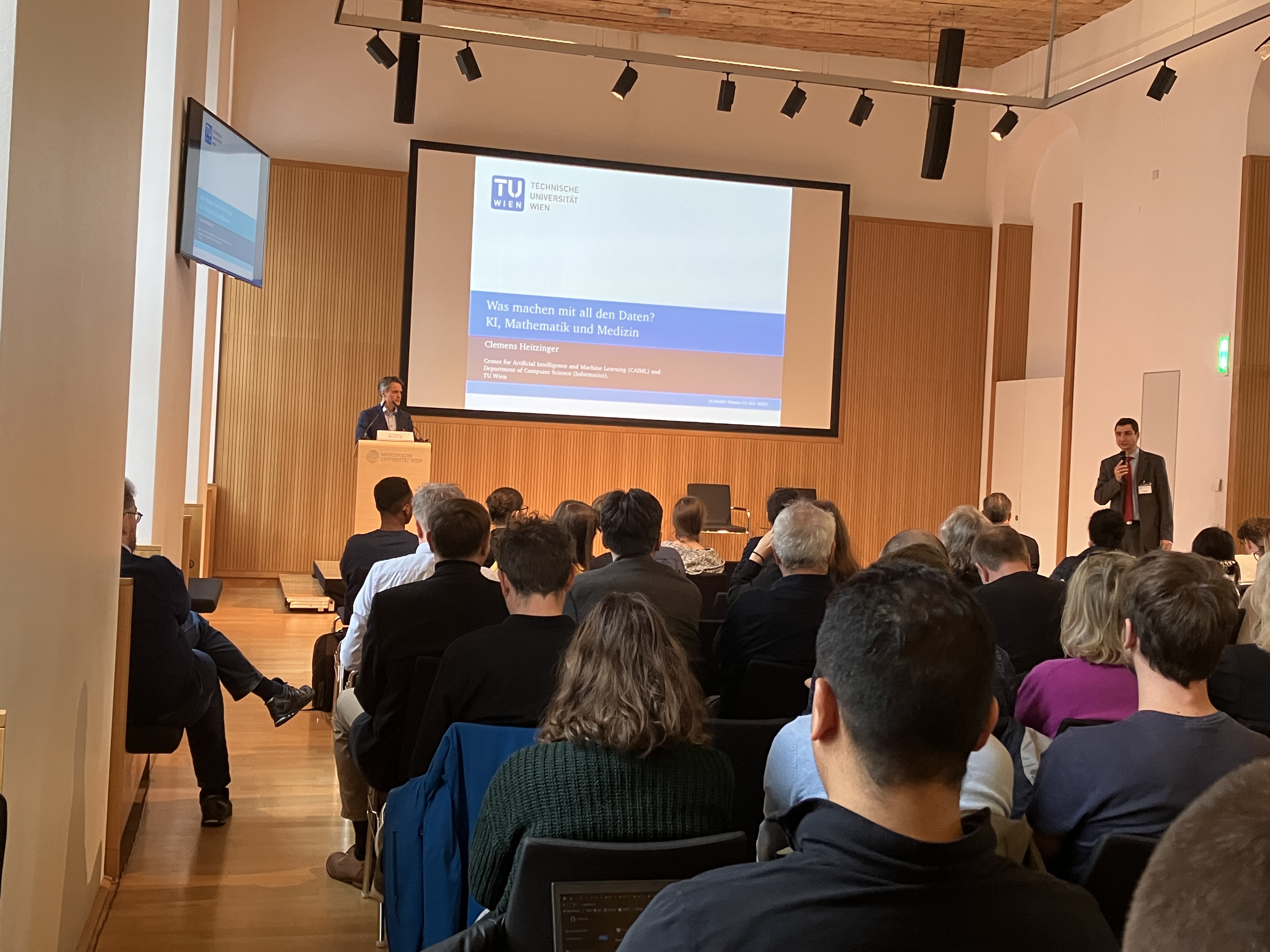
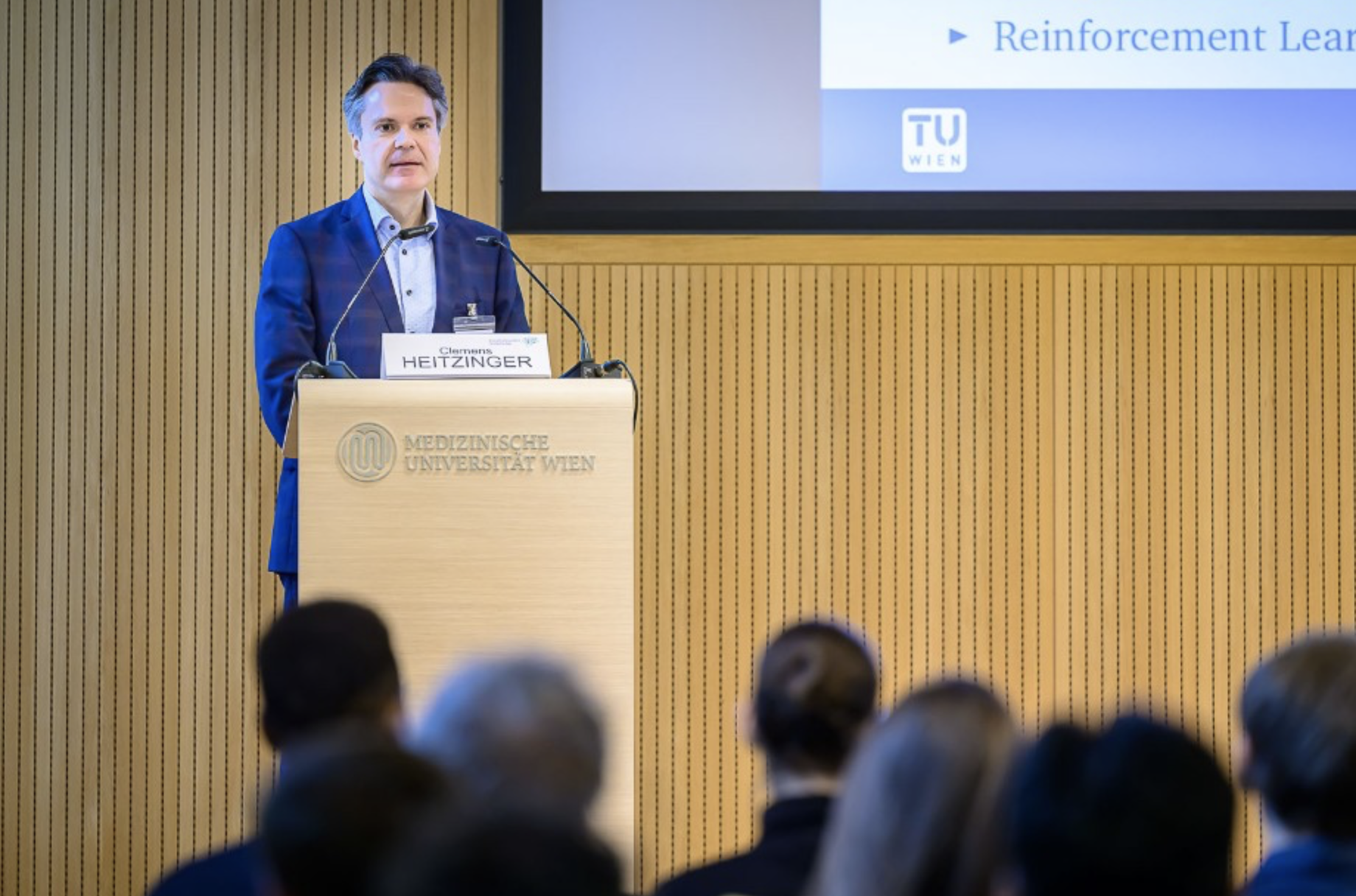
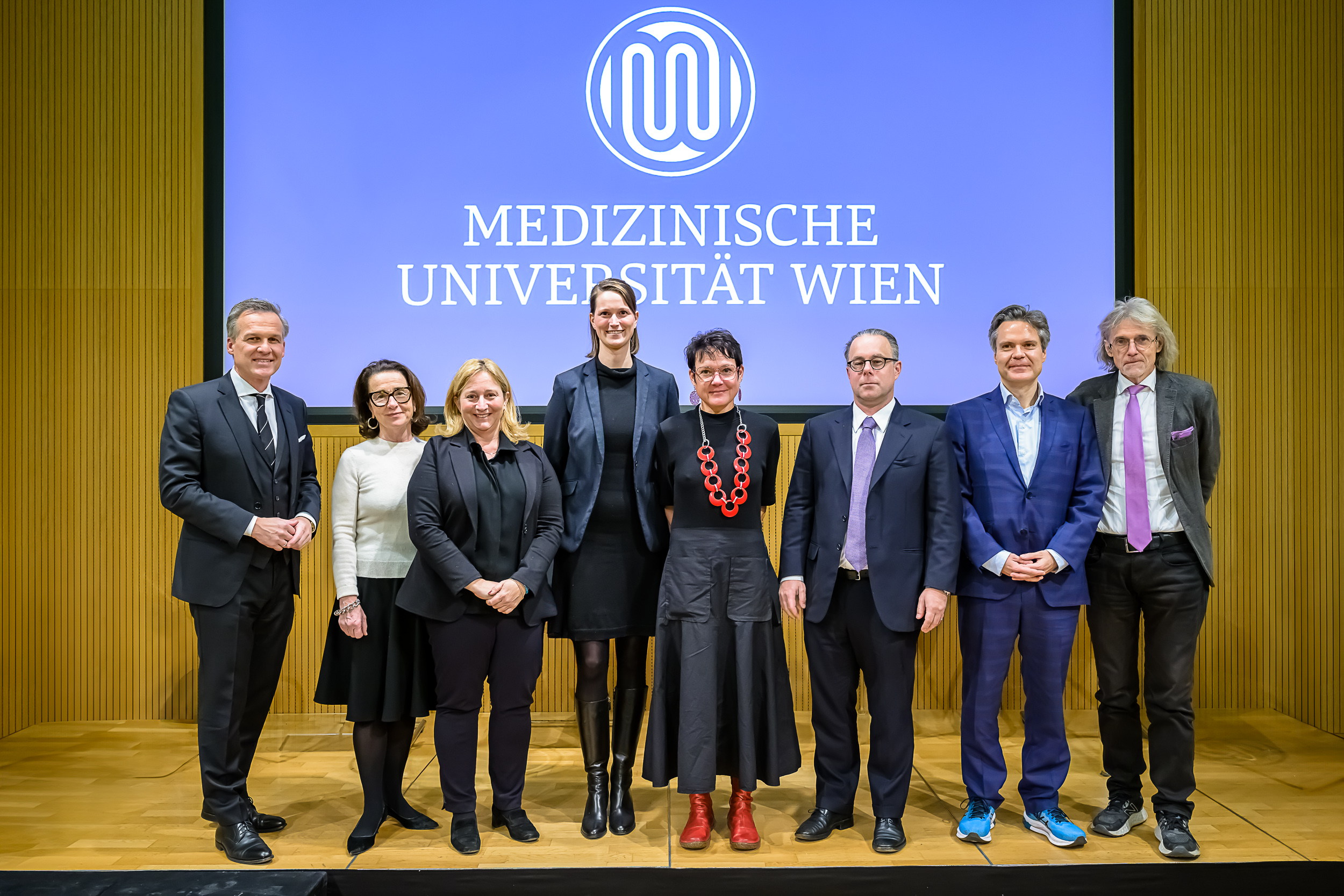
Photo credit: MedUni Wien / Marko Kovic.
31 New Book Introduction to Digital Humanism Out Soon! (9 November 2023)
Thanks to the editors for their initiative!
32 Article in kma Online (20 October 2023)
kma Online has published the article Wie Blutvergiftungen mit künstlicher Intelligenz geheilt werden könnten about our work on reinforcement learning for sepsis treatments. kma is short for Klinik-Management aktuell and the leading magazine for decision-makers in clinics in the D-A-CH area. It publishes news about clinic management, health care, health-care policy, and medical technology.
33 AI against Sepsis Nominated for the futurezone Award 2023 (12 October 2023)
We have been nominated for the futurezone Award 2023 in the category Health Tech, thus being among the three finalists.

34 Austrian Fundraising Congress (10 October 2023)
I was happy to give the keynote on Tuesday at the 30th Austrian Fundraising Congress, talking about the past, present, and future of artificial intelligence.
35 Article in News (6 October 2023)
News, Austria’s largest weekly news magazine, published a 6-page article about artificial intelligence in medicine titled Doktor Digital, featuring our work on reinforcement learning for treating sepsis in intensive-care units.
36 Expedition KI 2.0 (4 October 2023)
On Friday, 4 October 2023, I took part in a panel discussion about the state of AI research with
- Robert Kleedorfer (Kurier, moderator),
- Daniel Naeff (ETH AI Center),
- Matthias Zeppelzauer (FH St. Pölten),
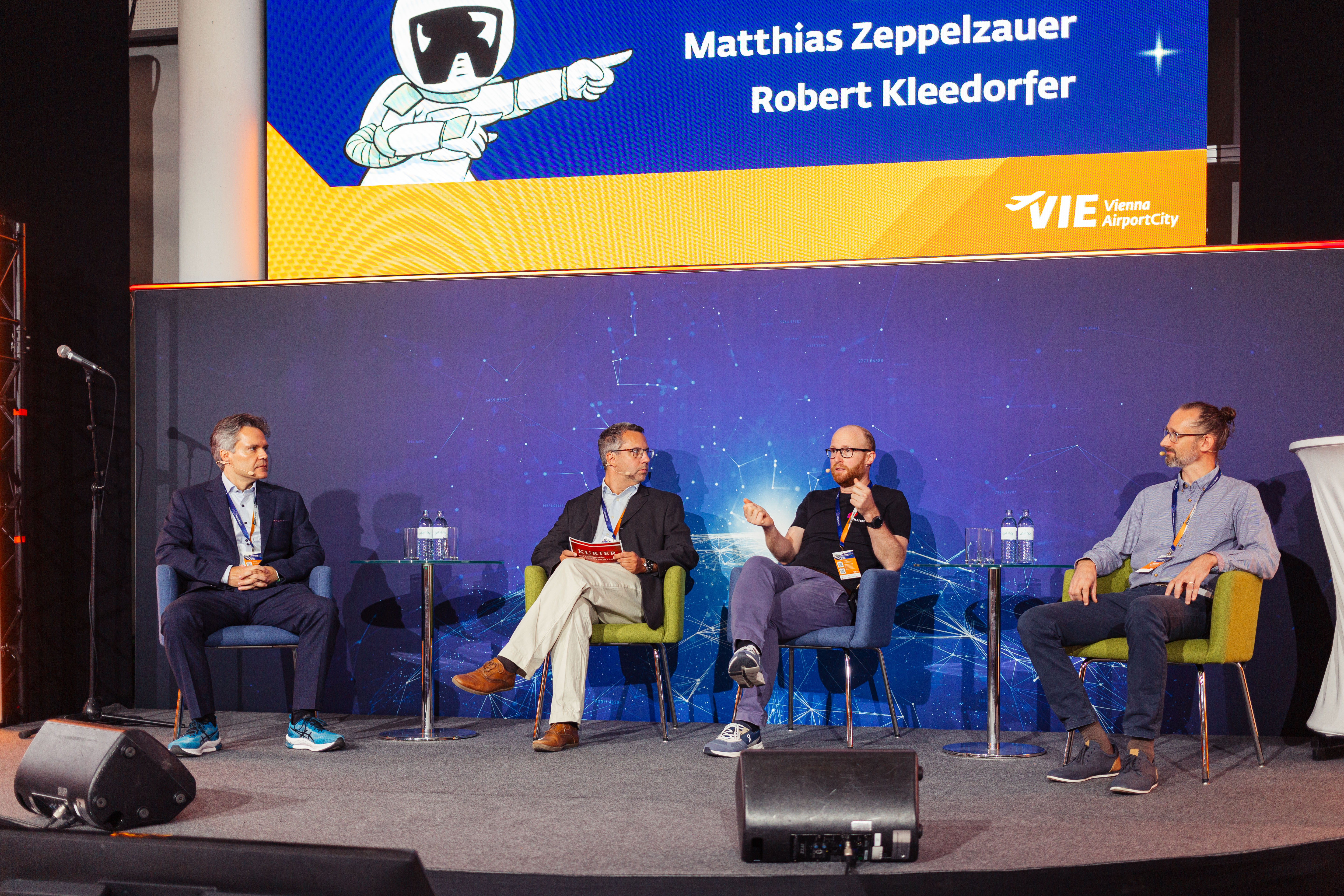
37 Science Talk (25 September 2023)
At the Science Talk on 25 September 2023, I discussed the topic AI – What Can We Still Trust? with
- Univ.-Prof. Mag. Dr. Matthias C. Kettemann, LLM (Institut für Theorie und Zukunft des Rechts, Universität Innsbruck),
- Dr.in Eugenia Stamboliev (Institut für Philosophie, Universität Wien), and
- Dr. Stefan Strauß (Institut für Technikfolgen-Abschätzung, Österreichische Akademie der Wissenschaften).
The invitation can be found here. Some photos are available here.
38 Informatics = Information + Mathematics (1 August 2023)
The Department of Informatics (Computer Science) at TU Wien is ranked #1 in Austria, #4 in the D-A-CH area, #23 in Europe, and #74 worldwide according to the QS University Ranking 2022. I am happy and proud to join the department starting in August, contributing to machine-learning research and focusing on TUW CAIML (Center for Artificial Intelligence and Machine Learning).
39 Comments on Large Language Models Encode Clinical Knowledge at science.orf.at and Interview in Ö1 (13 and 14 July 2023)
I comment on the paper Large Language Models Encode Clinical Knowledge (by Google Research, the National Library of Medicine, and DeepMind) in Ö1 Wissen aktuell (science radio program by the Austrian Broadcasting Corporation ORF) on Friday, 14 July 2023. An accompanying article was published online at science.orf.at on Thursday, 13 July 2023.
40 Newspaper Article in Der Standard (7 July 2023)
Der Standard, one of Austria’s leading newspapers, published a one-page article about my work in reinforcement learning and sepsis treatment on page 11.
- Eine KI berät bei Blutvergiftung (online version)
- Eine KI berät bei Blutvergiftung (print version)
41 First ASAI/CAIML National Summer School in Artificial Intelligence (3–7 July 2023)
The announcement, program, and all details of the First ASAI/CAIML National Summer School in Artificial Intelligence can be found here.
42 Two-Part Interview by medinlive (19 June 2023 and 26 June 2023)
A long two-part interview (in German) about our work on reinforcement learning in intensive-care units and about ethical questions was published by medinlive, the medical information and news website of the Viennese medical association.
- Wenn KI den Weg vorgibt (Teil 1)
- „Ethische Probleme entstehen auch durch Verzicht auf den Einsatz“ (Teil 2)
43 Mayrs Magazin in ORF2 (16 June 2023)
Mayrs Magazin, the science show by ORF (Austrian Broadcasting Corporation) on Fridays at 18:30, brought a segment on generative AI and the current research race with comments by myself on Friday, 16 June 2023.
44 New Initiative by the CAIML SIG Generative AI and Became AI (June 2023)
Generative AI will be the most significant disruption of our lifetimes. It is our obligation as scientists to guide the application and further development of this technology in such a way that it benefits us all.
We are pleased to announce that we have just launched the Became AI platform in collaboration with CAIML at TU Wien and its newly established special interest group (SIG) Generative AI. One of its initiatives is the Became AI Forge, which provides a guided three-months program offering hands-on mentorship and sponsored resources such as API access and cloud GPUs for exploring generative AI.
Besides that, there will be the Became AI Lab bridging science and businesses, where you will be able to apply your learnings from the Became AI Forge to real-world projects with real-world data.
Our big vision is to build an initiative that has an impact beyond individual projects. We want to drive the adoption of generative AI in Austria and also create our own large language model (LLM) in order to become independent from big-tech companies.
As TU Wien is going to offer classes on generative AI starting this fall, there will be the option to have your practical work recognized there.
If you want to join our first batch of the Became AI Forge, please register on our website https://became.ai/ till 15 June 2023 at 23:59. If you have any further questions, please email us at mailto:tuwien@became.ai.
45 Panel Discussion about Generative AI / ChatGPT at Vienna City Hall (5 June 2023)
In a panel discussion moderated by Eva Stanzl, Olga Grjasnowa, Georg Psota, and myself discussed Generative AI, ChatGPT, and their ramifications for our future.
- Introduction: Anita Eichinger, Director Vienna City Library (Wienbibliothek im Rathaus)
- Welcome address: Wolfgang Renner, Wiener Zeitung
- Moderation: Eva Stanzl, Wiener Zeitung, Vorsitzende des Klubs der Bildungs- und Wissenschaftsjournalist:innen Österreichs
- Panel:
- Olga Grjasnowa, Institut für Sprachkunst, Universität für angewandte Kunst Wien
- Clemens Heitzinger, Co-Direktor des Center for Artificial Intelligence and Machine Learning (CAIML), TU Wien
- Georg Psota, Chefarzt der Psychosozialen Dienste Wien
Articles:
- Announcement in Wiener Zeitung: Digitaler Humanismus – Ein Troll fegt durch die Welt – ChatGPT, Mythos trifft Wahrheit trifft Chancen
- Article in Wiener Zeitung (online): Digitaler Humanismus – KI, sagt der “Hausverstand”
- Article in Wiener Zeitung (print): Digitaler Humanismus – KI, sagt der “Hausverstand”
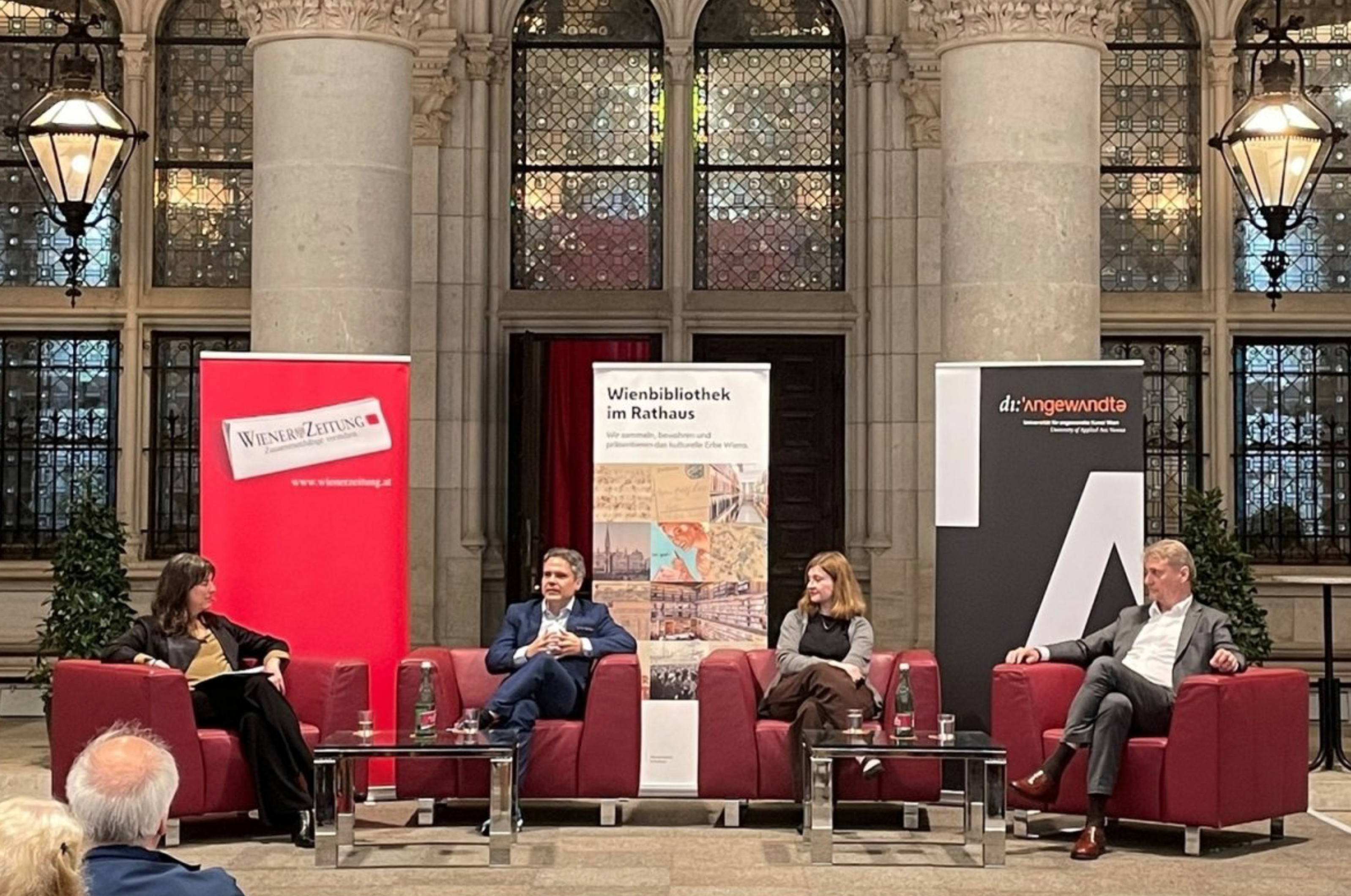
Source: Wiener Zeitung
46 Artificial Intelligence as Life-Saver / Künstliche Intelligenz als Lebensretter (5 June 2023)
We made the headline of Kurier, one of Austria’s leading newspapers, on 5 June 2023: Artificial Intelligence as Life-Saver.
The article on page 19, also available at Future Zone, discusses how we worked on reinforcement learning to calculate optimal treatments.
47 Interview at TUW Live Event (25 May 2023)
The TUW Live event on Future Technologies featured a 20-minute interview about ChatGPT (Large Language Models). You can find the recap here.
48 Media Echo to the Press Release about the AI Doctor (May and June 2023)
- Article in Science Daily (11 May 2023): Better than humans: Artificial intelligence in intensive care units
- Article at science.orf (Austrian Broadcasting Corporation, 11 May 2023): KI erstellt Behandlungspläne für Blutvergiftung
- Article in Kurier (Austrian newspaper, 11 May 2023): So hilft “Doktor KI” bei der Behandlung einer Blutvergiftung
- Article in medinlive (medical news, published by Ärztekammer für Wien, 11 May 2023): Wie “Doktor KI” Behandlungsschemata erstellt und entlastet
- Radio report in Ö1 Morgenjournal (cultural and news radio channel by Austrian Broadcasting Corporation, 22 May 2023)
- Article in India AI (1 June 2023): AI model’s decision making outperforms humans in intensive care units
49 Press Release by TU Wien (11 May 2023)
A press release by TU Wien features our collaboration with Medical University Vienna. We worked on reinforcement learning to learn optimal sepsis treatments in intensive care. See my publications here and here, also available from my list of publications ([84, 85]).
50 New Research Project Reliable Reinforcement Learning for Sustainable Energy Systems (RELY)
My latest research project Reliable Reinforcement Learning for Sustainable Energy Systems (RELY), funded by FFG’s AI for Green initiative, will start in September 2023.
51 Article in Trend about AI Engineers (17 April 2023)
The article “AI Engineer: Der Job des KI-Ingenieurs” with quotes by myself about the roles of AI engineers was published by the well-known Austrian monthly magazine Trend.
52 Articles in Future Zone and Kurier about ChatGPT and the Job Market (9 March 2023)
The article “Warum ChatGPT so schnell kein Job-Killer ist” with quotes by myself was published by well-known Austrian newspaper Kurier and online magazine Future Zone.
- Article (online) at Future Zone (9 March 2023)
- Article in Kurier (9 March 2023)
53 Café Puls by Puls4 Focuses on ChatGPT from 6 March to 10 March 2023
Puls4, one of Austria’s leading private TV stations, focuses on ChatGPT in Austria’s most popular breakfast TV show Café Puls (5:30–12:00) from Monday, 6 March, to Friday, 10 March 2023, including some statements by myself about how ChatGPT works and possible ramifications.
- 10.3.2023: ChatGPT: Zukunft oder KI-Albtraum?
- 9.3.2023: Kosten uns KI-Systeme künftig Jobs?
- 8.3.2023: Schüler:in oder Künstliche Intelligenz?
- 8.3.2023: Das KI-Experiment im Klassenzimmer
- 7.3.2023: Künstliche Intelligenz macht Schule
- 6.3.2023: ChatGPT: revolutionär oder gefährlich?
54 Interview in News (3 March 2023)
News, Austria’s largest weekly news magazine, chose artificial intelligence as the cover story of its 3 March 2023 issue (no. 9/2023).
For this issue, I was interviewed about ChatGPT. You can find the interview on page 48.
55 My Book Algorithms with Julia is Out Now
For more information, see here.
56 Two New FWF Projects for My Former PhD Students
I am happy to congratulate my former PhD students Amirreza Khodadadian and Leila Taghizadeh on their successes in the latest FWF (Austrian Science Fund) founding round. In 2023, both will head their first research projects as PIs. Amir’s project is called Using Single Atom Catalysts as Nanozymes in Field-Effect Transistor Sensors, and Leila’s is called Computational Uncertainty Quantification in Nanotechnology.
57 AIDA Course on Reinforcement Learning
I am happy to announce that my course on reinforcement learning has been accepted as an AIDA course, being open to all AIDA students online. Registration will start in February 2023, and the course will start beginning of March 2023.
Course
homepage at AIDA
Course
homepage at TU Wien (TISS)
58 Deepfakes in Der Falter
Der Falter, an Austrian weekly newspaper, published an article by Tessa Szyszkowitz about deepfakes (issue 2022/28 dated 12 July 2022).
59 CAIML Opening
The opening of the TUW Center for Artificial Intelligence and Machine Learning (CAIML) took place on Thursday, Dec 2, 2021 with a keynote by Turing Award winner Leslie Valiant and a panel discussion with Gerhard Friedrich, James Larus, Helga, Nowotny, and Paul Timmers. The announcement and details can be found here. Slides, photos, and the video can be found here. The CAIML website is caiml.org.
59.1 Press Coverage
- Article in Die Presse (11 Dec 2021)
- Article (online) in Wiener Zeitung (2 Dec 2021)
- Article in Kurier (30 Nov 2021)
- Article in Future Zone (29 Nov 2021)
- Article in TUW Magazine (2021)
60 TUW is Founding Member of AIDA
TUW is founding member of AIDA (International Artificial Intelligence Doctoral Academy). Thomas Eiter is the Representative of TU Wien at AIDA.
61 15th ÖGOR Workshop Mathematische Ökonomie und Optimierung in der Energiewirtschaft
The 15th ÖGOR Workshop Mathematische Ökonomie und Optimierung in der Energiewirtschaft will take place on September 23 and 24, 2021 at Webster Vienna Private University. You can find the announcement here. Focus areas are optimization, statistical learning, machine learning, AI, open data and open-source tools, and the effects of the corona pandemic on energy modeling.
62 Doctoral Program ENROL Will Start in October 2021
The MSCA COFUND doctoral program Engineering for Life Sciences (ENROL) with a total volume of 3.25 M€, cofunded by the European Commission, will start in October 2021 and run till September 2026. You can apply for a PhD position here.
63 Double-Degree Program with University of Modena and Reggio Emilia Signed
A double-degree program between the University of Modena and Reggio Emilia and TU Wien has been signed. It allows selected students to obtain a double PhD degree in applied mathematics and/or information and communication technologies.
64 Dr. Leila Taghizadeh Wins Hannspeter Winter Prize 2020
The Hannspeter Winter Prize is the annual prize for the best PhD thesis by a female student at TU Wien. Each of the eight departments may nominate at most one candidate, resulting in an interdisciplinary competition.
Dr. Leila Taghizadeh has been awarded the Hannspeter Winter Prize 2020 of TU Wien for fundamental research in applied mathematics. Press release by TU Wien.
Congratulations to Leila!
Since her PhD defense in October 2019, Leila is a postdoc in my group Machine Learning and Uncertainty Quantification at the Institute of Analysis and Scientific Computing at TU Wien. Her work focuses on mathematical modeling, analysis, and simulation of stochastic PDE systems with applications in biology, medicine, and physics. Currently she is also working on uncertainty quantification in epidemiological models (applied to COVID-19).
65 Academic Board of the PhD Program in ICT at the University of Modena and Reggio Emilia
I was kindly asked to serve as a Distinguished International Member on the Academic Board of the PhD Program in Information and Communication Technologies (ICT) at the Department of Engineering Enzo Ferrari of the University of Modena and Reggio Emilia.
66 The Class on Reinforcement Learning is now Part of the Data-Science Curriculum at TU Wien
The lecture Reinforcement Learning (lecture with tutorial, 101.789 VU Reinforcement Learning, 4h, 6 ECTS) taught by Daniel Pasterk and myself, is now officially part of the curriculum for the MSc degree in Data Science in the module MLS/EX Machine Learning and Statistics – Extension.
67 New Initiative MLTUW
MLTUW is a new initiative that promotes the use of advanced and reliable machine-learning methods in science and technology at TU Wien. Please see the MLTUW page for more information.
68 15th ÖGOR Workshop Mathematische Ökonomie und Optimierung in der Energiewirtschaft (Postponed till 2021 due to COVID-19 Pandemic)
Gemeinsam mit Ronald Hochreiter (Webster University), Daniel Huppmann (IIASA), Gerold Petritsch (EVN, ÖGOR) und Leopold Sögner (IHS) organisiere ich den 15. ÖGOR Workshop über Mathematische Ökonomie und Optimierung in der Energiewirtschaft vom 25. bis 26.6.2020 an der Webster University Wien. Offizielle Ankündigung.
69 Minisymposium Optimization and Model-Free Learning at SIAM MDS 2020 (Postponed due to COVID-19 Pandemic)
I am organizing the minisymposium on Optimization and Model-Free Learning at the SIAM Conference on Mathematics of Data Science (MDS20).
70 Thematic Program on Uncertainty Quantification in May/June 2020 (Postponed to 2022 due to COVID-19 Pandemic)
We will organize five workshops at the Erwin Schrödinger Institute (ESI) in Vienna within the thematic program Computational Uncertainty Quantification: Mathematical Foundations, Methodology and Data in spring 2020:
- multilevel and multifidelity sampling methods in UQ for PDEs,
- PDE-constrained Bayesian inverse UQ,
- statistical estimation and deep learning in UQ for PDEs,
- approximation of high-dimensional parametric PDEs in forward UQ,
- UQ in kinetic and transport equations and in high-frequency wave propagation.
The homepage of the thematic program at ESI is here.
71 Article in Austria Innovativ Spezial in March 2019
I was interviewed for an article in Austria Innovativ Spezial that appeared in March 2019.
72 VICEM Faculty Talk on 15 March 2018
I gave the faculty talk entitled Nanoscale Sensors for Biomolecule Detection and DNA/RNA Sequencing: Theory and Applications at the VICEM Diploma Thesis Award Ceremony.
73 Science Talk on 20 February 2017
Einladung als PDF-Datei, Link.
Podiumsdiskussion zum Thema Wie funktioniert Wissenschaft heute? Der Science Talk blickt “hinter die Kulissen” mit:
- Univ.-Prof. Dr. Ulrike Felt, Universität Wien,
- Assoz. Prof. Dipl.-Ing. Dr. Clemens Heitzinger, Technische Universität Wien,
- Prof. Dr. Klement Tockner, Präsident des Fonds zur Förderung wissenschaftlicher Forschung (FWF),
- Univ.-Prof. Mag. Dr. Susanne Weigelin-Schwierdrzik, Universität Wien.
Danach Überreichung der Auszeichnung Wissenschaftsbuch des Jahres durch Dr. Reinhold Mitterlehner, Vizekanzler und Bundesminister für Wissenschaft, Forschung und Wirtschaft.
Datum: 20. Februar 2017
Beginn: 18:00
Ort: Aula der
Wissenschaften, Wollzeile 27a, 1010 Wien
74 Newspaper Article in Der Standard
Austrian national newspaper Der Standard wrote an article about my work: Forscher rechnen mit Nanotechnologie — Researchers Count on / Simulate Nanotechnology. (The German title contains a pun.)
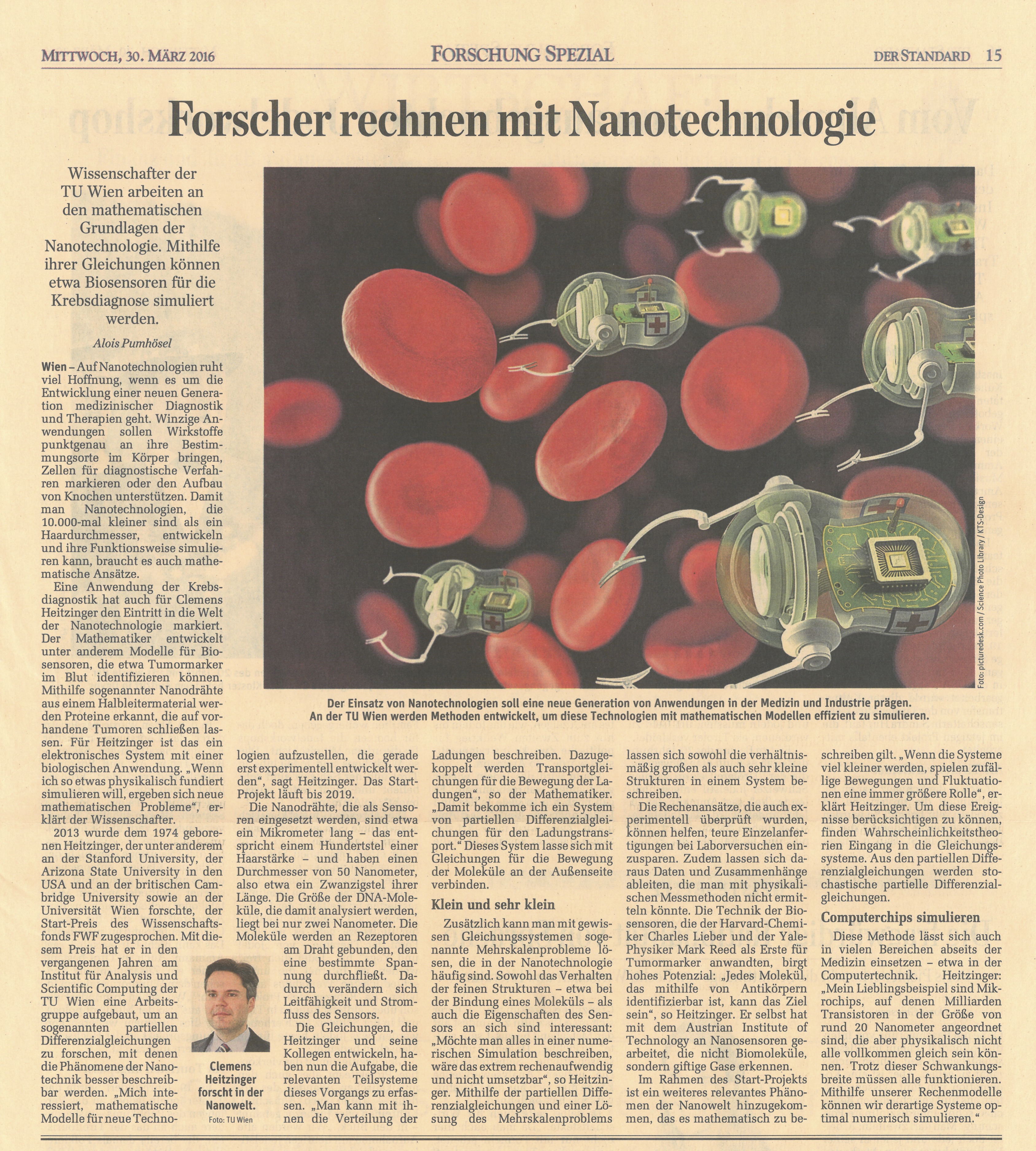
75 Group Photo October 2015
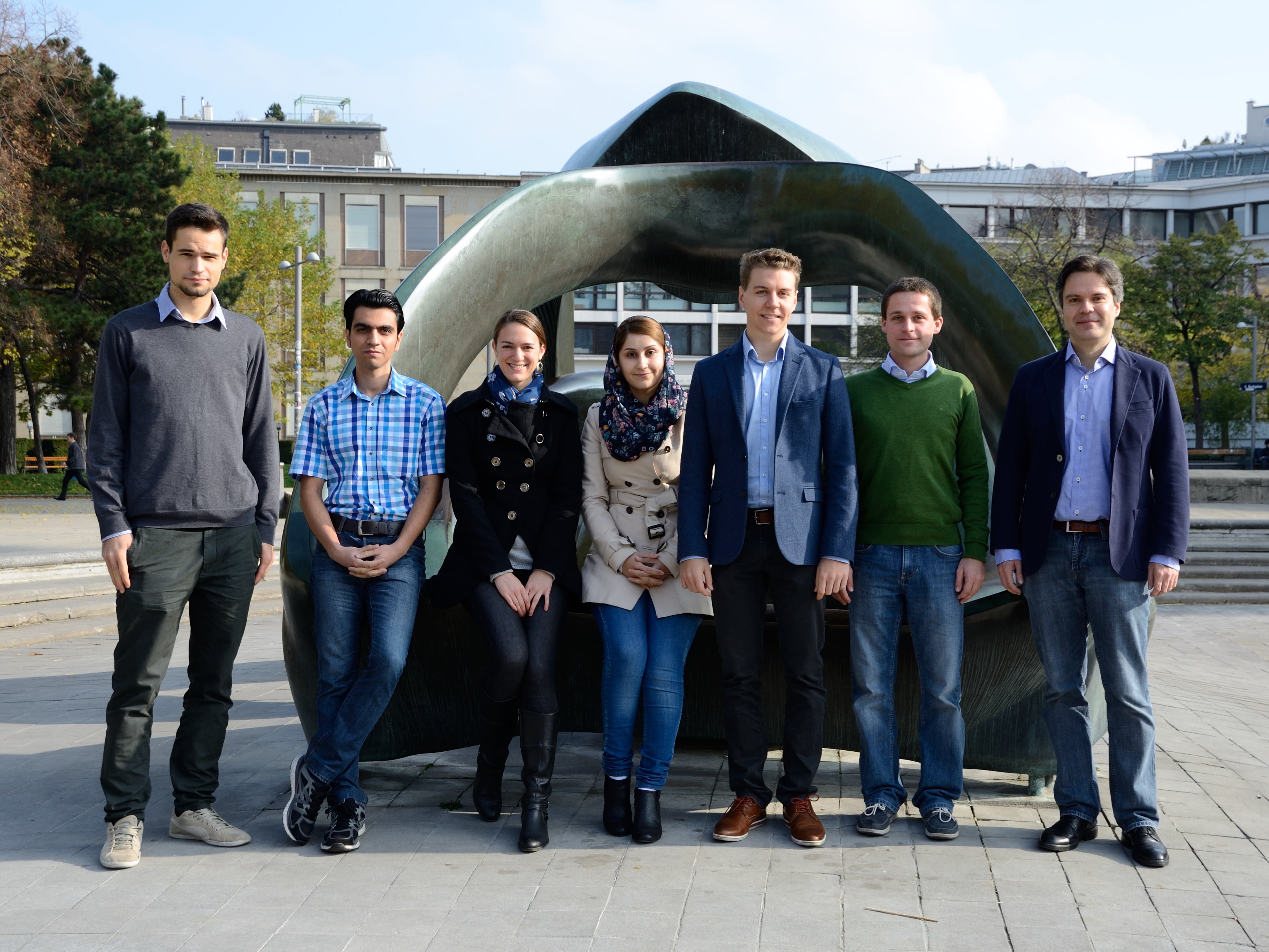
From left to right: Gudmund Pammer, Amirreza Khodadadian, Caroline Geiersbach, Leila Taghizadeh, Benjamin Stadlbauer, Gerhard Tulzer, Clemens Heitzinger. (Not shown: Andreas Buttinger-Kreuzhuber, Gregor Mitscha-Eibl.)
76 Exhibition Wunderkammer 2015 Celebrating 200 Years TU Wien
76.1 The Exhibition
TU Wien celebrated its 200th anniversary on November 6, 2015. To mark the occasion, the exhibition Wunderkammer 2015 was open to the public in TU Wien’s main building in November 2015. Its topic was What’s Next?, bringing together science, technology, and art and familiarizing the general public with new developments. About 100 submissions were received by the organizers of Wunderkammer 2015, and about 30 were selected by a jury of experts. My group presented an overview of our work.
76.2 The Presentation
In addition to actual nanowire gas sensors and posters, we showed this presentation (in German). Special thanks to Benjamin Stadlbauer for preparing the presentation with nice animations and many explanations.
The presentation can be viewed here as a movie file. You can view it full-screen by clicking on the “enlarge” button; the movie file is 1920×1080.
76.3 Press and TV Coverage
This article, Neue Wunderwelten, reports from the exhibition and mentions us. Further articles are here and here.
ORF, Austria’s largest TV station, reported about the opening of the exhibition. Visitors in front of our booth are shown here.
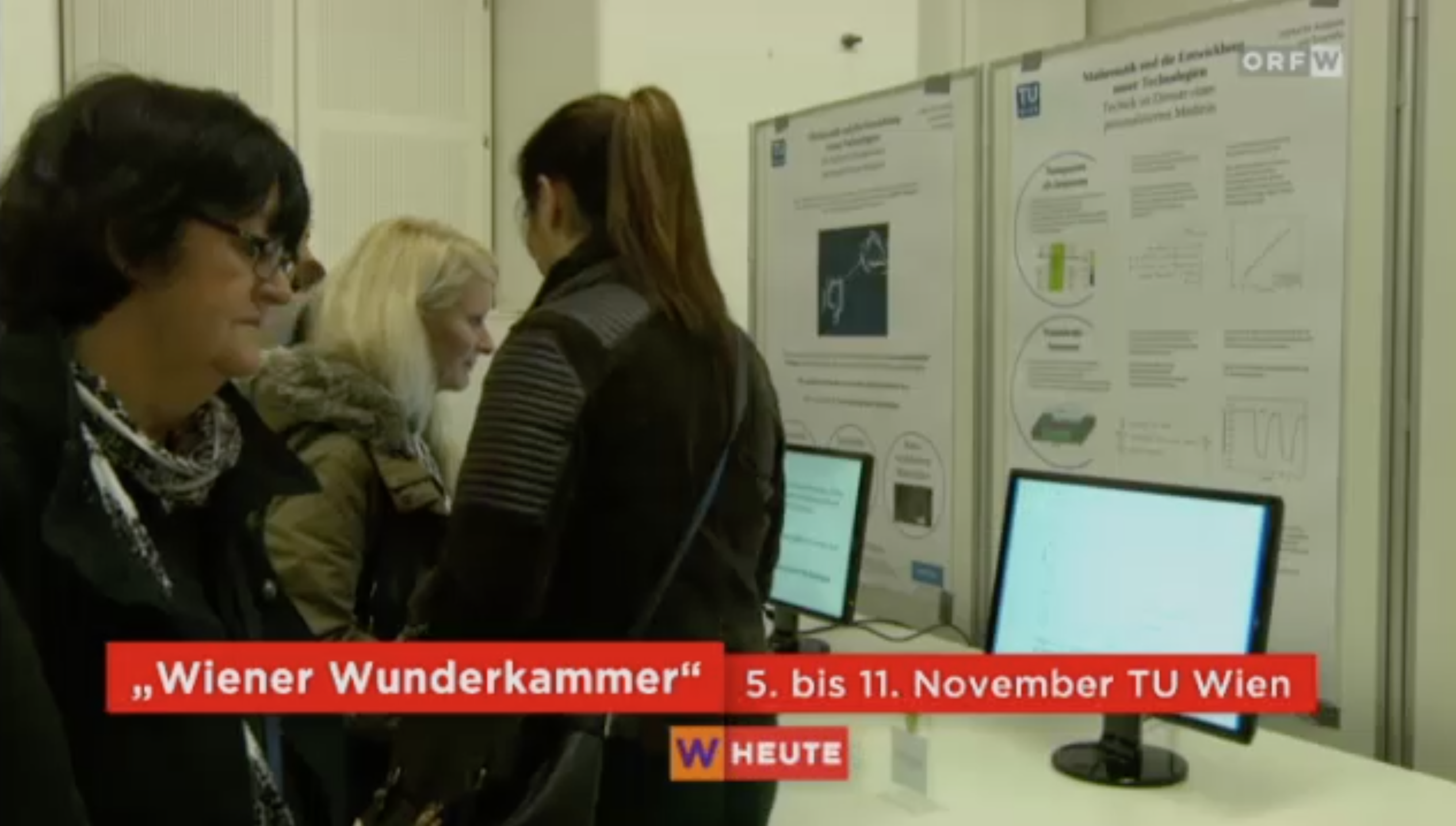
77 Gastkommentar in der Presse über die UG-Novelle (7 Oct 2015)
My comment (Gastkommentar) on the law amendment changing the organization of Austrian universities appeared in the Austrian newspaper Die Presse on 7 October 2015.
78 Another Article about My Work
In May 2015, I was interviewed about my work at TU Wien and the topic of the START Prize: Mathematik für die Nanotechnologie.
79 Article about My Work
In December 2013, I was interviewed about my work and the START Prize: Math researcher earns prestigious START Prize.
